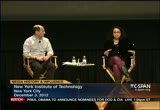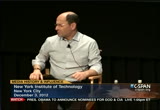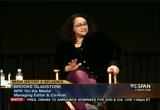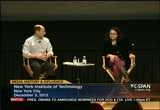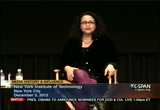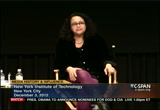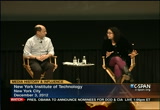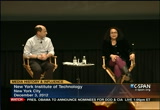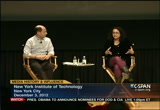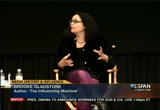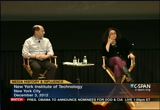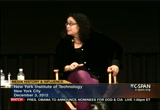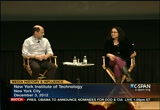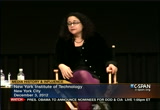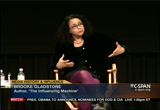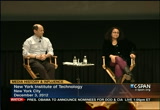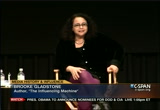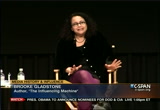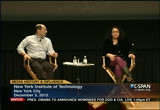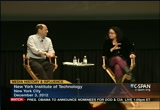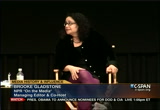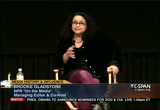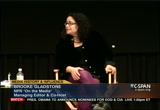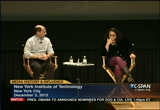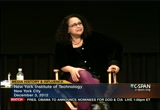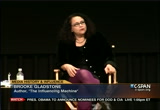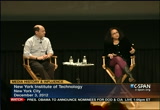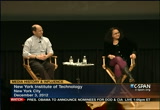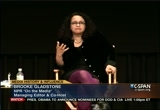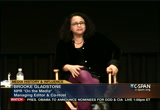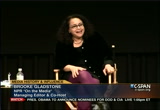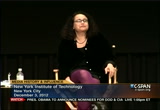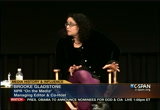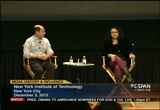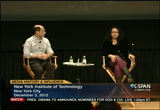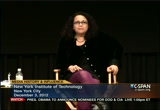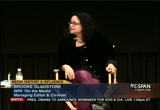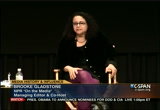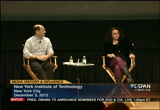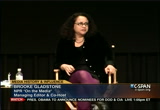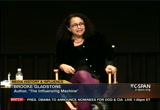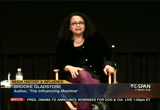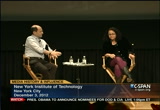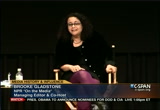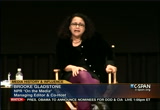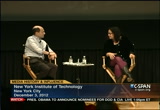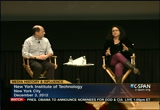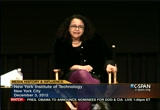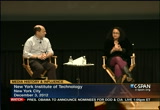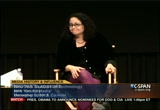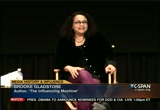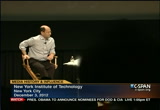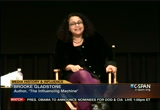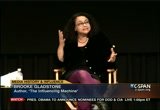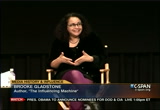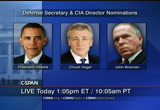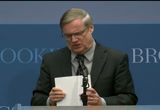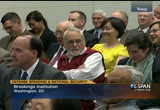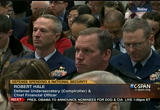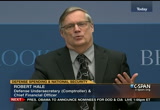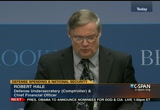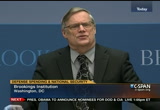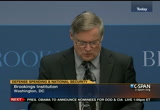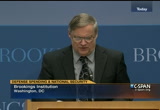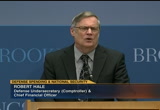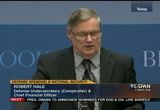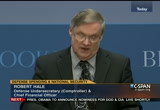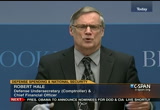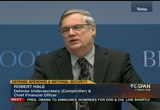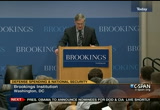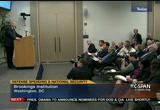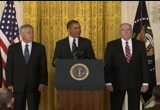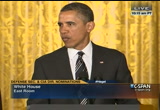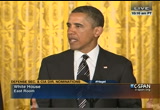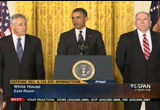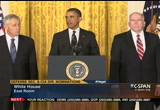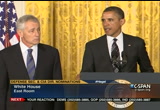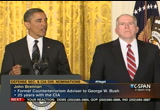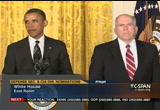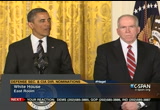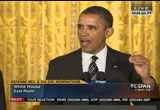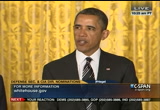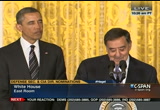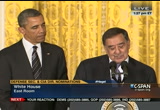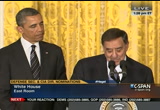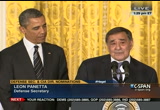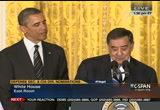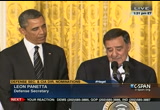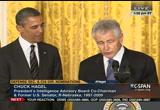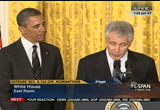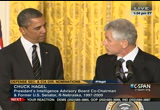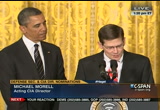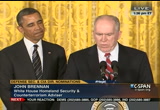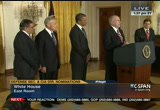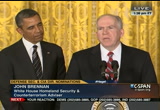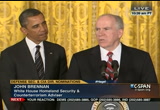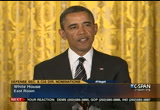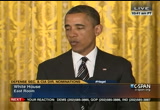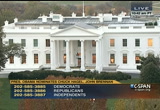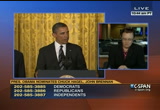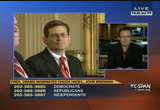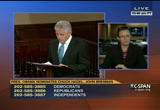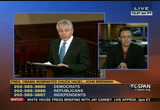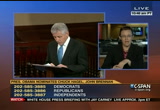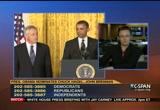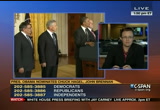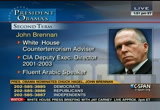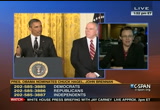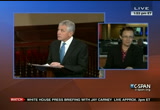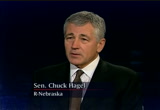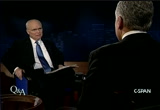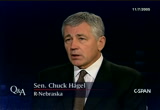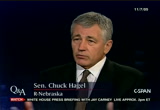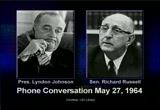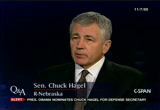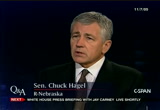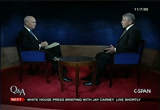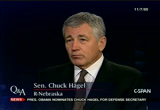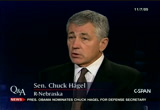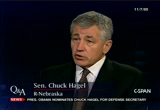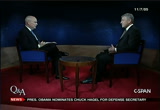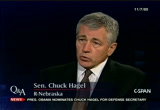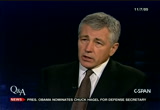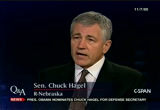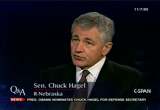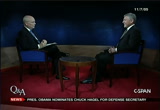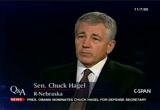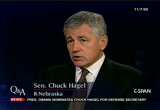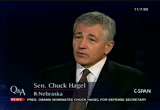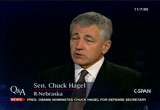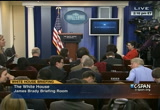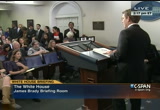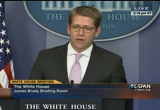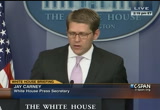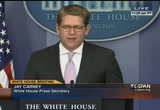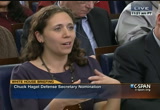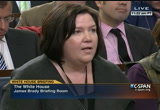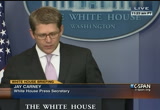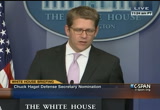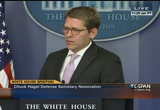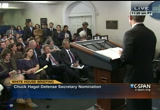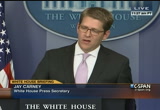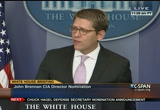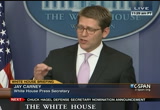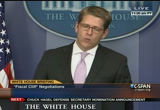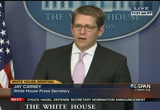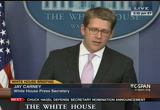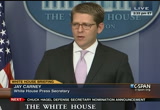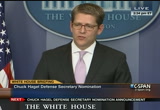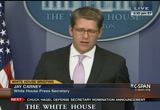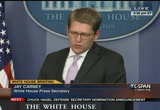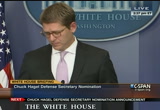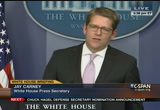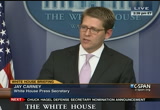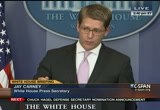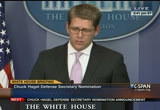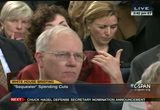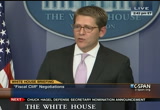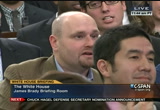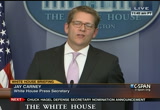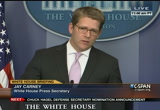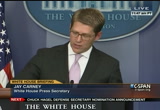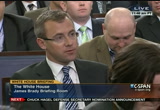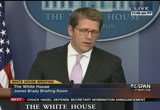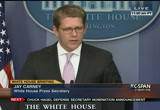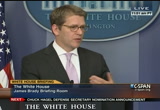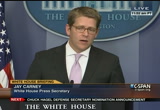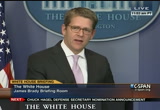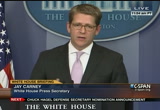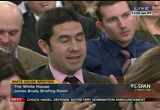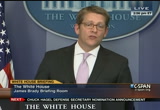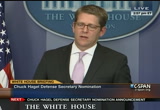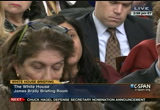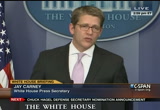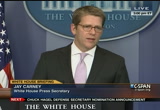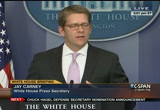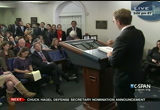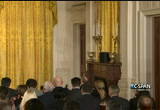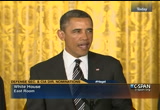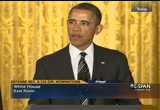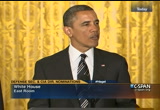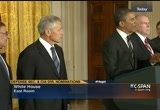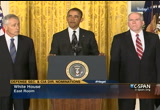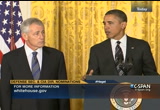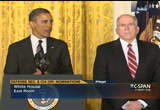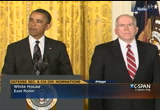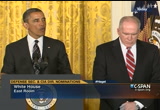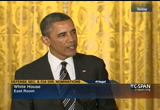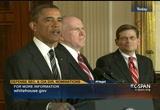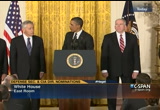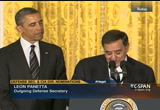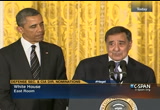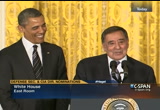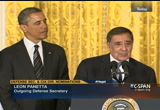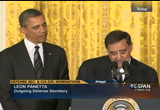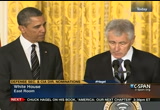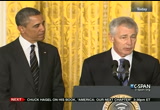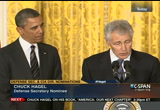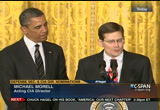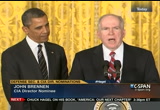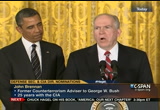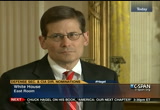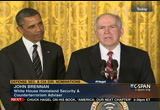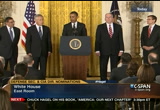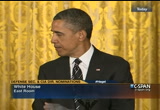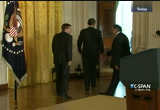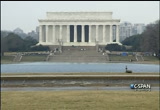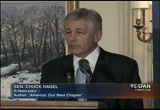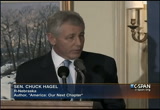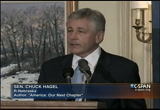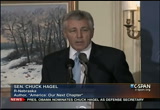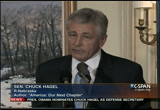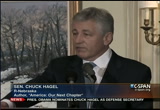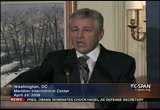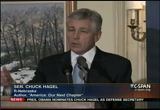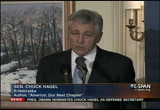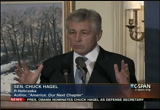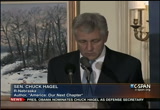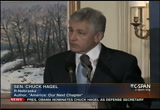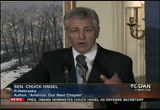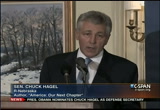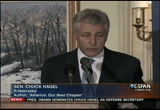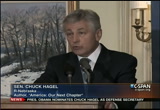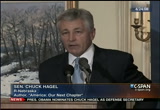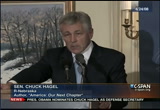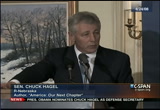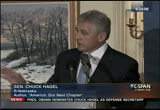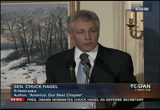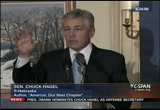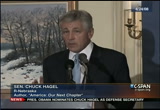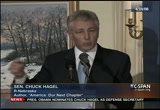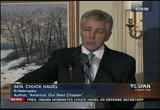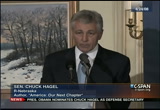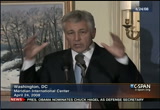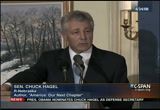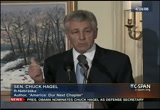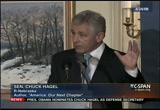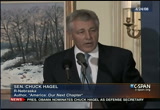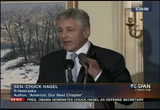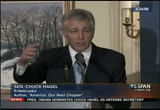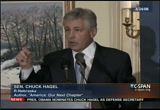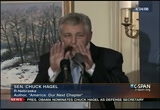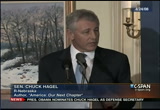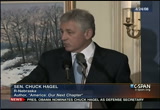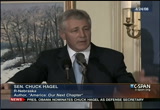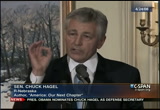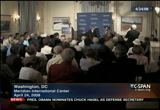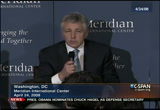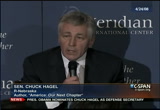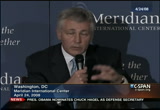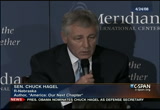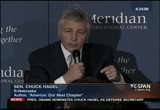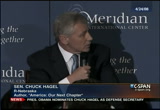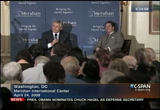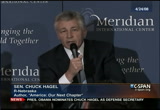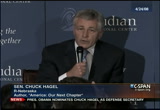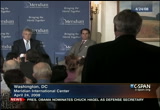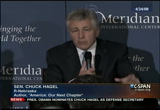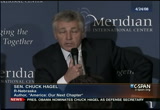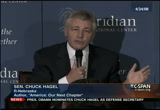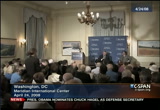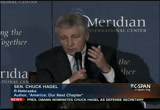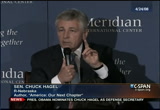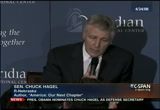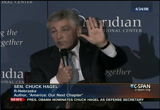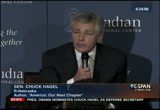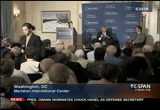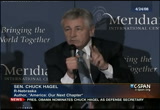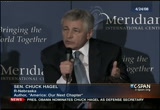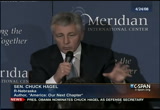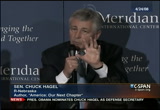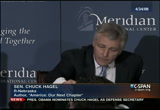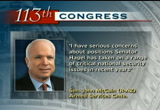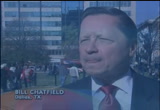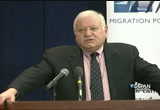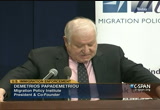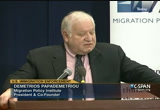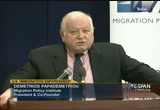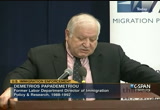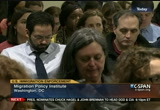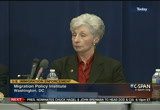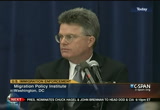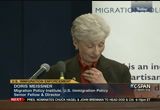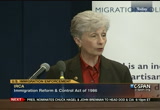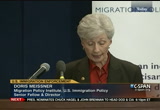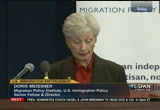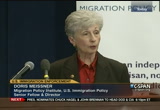tv Public Affairs CSPAN January 7, 2013 12:00pm-5:00pm EST
12:00 pm
that was filled with guesswork. it served journalism. he came in and fill this need and i think by any terms, he is doing great. he is a household word. those are just two examples of people who were passionate and knowledgeable and found their way into an area that people were not following. looking to, not me. my path was weird and cannot be followed. >> let's open it up to questions from the audience. when you come to the
12:01 pm
microphone, please give us your name and where you go to school. if anyone would like to come up. here is our first inquire. he is adjusting it. until someone gets the courage up, you mentioned nate silver. he offers the fascinating thesis that it is that talking heads on all the cable channels are the ones who are constantly predicting things that, believe it or not, have the worst prognostication records. >> he said that the amount of minutes you are on television are inversely proportionate to the accuracy of your predictions. >> i listen to your show every
12:02 pm
sunday afternoon. i want to know, i saw on your web site that you went through an independent bookseller. i am wondering about the role of amazon in the book industry and how it is hurting it. >> actually, norton bought the book. they wanted it. i was delighted that they did. we were proceeding along very well. it is owned by time warner, and they came in and said by the way, we own all rights to it.
12:03 pm
we can do what we want with it without any input. it started as a graphic novel, which i shifted to a nonfiction when i discovered i did not know how to plot any thing. if warner brothers just wanted to buy it and do anything they wanted with it, i would have done that. but they could not go in and change 30 years of work and my conclusions, so i just took the whole project and walked away. norton is an employee-owned house, but that was just serendipity. >> you have done many shows on the decline of global media. i know you have tackled the music industry. given the fact that you have grown up with the media, doesn't give you a sense of regret that so many of these
12:04 pm
empires are toppling, or does the expectation of new media, which cover extensively on your program, fill you with the sense that this is all for the good? >> in the book, i quote the lakes, great douglas adams. he says that any kind of technology that was around when you were born is right and natural. is in the natural order of things. anything that comes along and around the age of 35 is fascinating and exciting and brilliant. anything that comes along after that is best to civilization and is going to destroy humanity as we know it. i think i am very lucky in having the job that i do, because i don't have the leisure to be incredibly blessed doubt it for my childhood.
12:05 pm
that was a world that i was not part of an was unlikely to ever be a part of. the kind of coverage that we get from anybody with a cell phone, all over the world, sullivan unreliable, is still astonishing and necessary. you brought up the arab spring. it brought up real-life coverage of hurricane sandy. it is everywhere we need to be, to paraphrase some advertisement or other. it is a great, wonderful new world. the big difference is that you as the news consumer have to do the work they did not have to do before. you have to choose your pension
12:06 pm
plan, your healthcare plan, paper or plastic. you have everything thrown in your lap, and maybe most important is the information you choose to consume. you are what you eat. if you eat nothing but chocolate pudding your entire life, then you can venture out there and very your diet. it is all there. there are so many times when i have spoken in public forums and people will say, why are the media not covering x? how did you find out about that? it was on page 6, but they thought it should be on page one. the media you consume are not reflecting your priorities. they are run by people.
12:07 pm
if you go straight to google news, you can have an algorithm doing that search for you. i think you just have to swallow hard, do a lot, and realize this is all up to you now. i am not startling for the world that was at all. >> that task of leaving it up to you can be kind of frightening. >> you have to find people you can trust. when you watch cbs or it read the new york times, those were your aggregators. it is not about "here is what i had for breakfast today." it is about "this person is incredible." they send me links from across the media and show me stories that i would not otherwise know. i have to say that i have my own twitter feed. i am a bit bifurcated. on the media calligraphy, i read avidly but rarely contributed to.
12:08 pm
they are the best aggregators that i have encountered of media stuff. that is just one. you find the people that you love and follow them, or website that you can subscribe to on twitter. to address another issue which is really critical, when you are talking about breaking out of your shell, in the parlance of our computer age, there's something called serendipity, which is accidental encounters with information that you would not. there are websites that are basically serendipity engines.
12:09 pm
they can connect you to stories that are fascinating, but you would never know. it is not impossible to find out this stuff. you just go there and you can create a live and rich array of information coming directly to you. you just have to build it. >> do you fear for the day when inevitably the new york times disappears? >> i don't think it is going to
12:10 pm
disappear. i really don't. i make this prediction before. i think that the new york times will become a boutique item that rich people get. for instance, you subscribe to the sunday new york times because you love the feel of newsprint on your hands and you love the magazine, the book review, and so on.
12:11 pm
you have a ritual and you pay for it. and you pay a lot for it. you already pay a lot for the new york times. it is expensive. but ultimately, the paper will be for people who want paper, and the information will be on- line and available through the various pay walz they are creating. >> i am a freelance journalist. you were talking about abrogating and curating. i started off as a writer/reporter. the thing that strikes me is that when you talk about the new york times, the one thing i found is that quality costs money. there is a lot of crap out there. >> tell me about it. [laughter] >> my question to give is, where is the money going to come from to finance quality
12:12 pm
journalism? it is a combination of the heavy stuff as well as up and coming stuff. but where is the money going to come from? >> it is a deep question, the question that everybody asks. the new york times has created a partial pay wall. it is actually doing pretty well now. old and barely perhaps the new york times and daily newspapers in general, they used to be one- stop shops. you had your movie reviews. you had a whole bunch of sections that could be done elsewhere and you did not need to have the local paper do it. it could also argue, there is new york sensibility, new york movie reviewers could have a different perspective that would be different from the cincinnati movie reviewer, perhaps. if there were, which there probably are not. but ultimately, newspapers have been mulling over the idea of becoming nonprofit. the trouble is that in order to be a non-profit, you are really cannot make a profit. they are having trouble getting
12:13 pm
around this. like the l.a. times got a big foundation grant. there will little bit of consternation in public radio circles about it. the point here is that the l.a. times can put its money in different subject. but they can get ford to come in and pay for local coverage or whatever public service coverage the money is going to be posturing, then it can put his money and other things. why are you not putting your
12:14 pm
money in the stuff that really matters? i think the foundations are understanding that these are valuable institutions and they need to be supported. partnerships, foundation grants, people talk about the project for public integrity in places like that that are funded by foundations or private individuals that are very public spirited. then they go and partner with the new york times or the washington post or the new yorker to get that information out. it is my understanding that the new yorker does not pay for a lot of the articles, they just provide the space. they are not just handing off their space, but there is, good
12:15 pm
reporting that is coming through these partnerships. that is part of where the money will come from. it is true that ultimately, people will have to, once again, pay for content, and publishers always prefer when their readers or consumers pay with their eyeballs. they find it the advertisers easier to deal with than consumers who want this and that. there have been magazines with hundreds of thousands of subscribers that have gone out of business because their ad rates have disappeared. their audiences would have paid more, but they thought it was too much of a headache. there is much to be done to educate the older generation of publishers to understand that they will have to engage on every level with their audiences in the next phase. >> my name is jeff roberts, former broadcast journalist. winston churchill famously said democracy is the worst possible form of government.
12:16 pm
i am curious what country you think might be doing a better job in disseminating news through the mass media where it is not as hysterical, not as pointed as our news coverage is. does anybody do it better, or is this just the way it is in free society? i hope you don't say great britain. >> i think this is the way it is. if you go to europe, you will find that they did not seem to go through this golden age. the big newspapers there are not owned by parties, they are affiliated with parties in their ideology. the editorial page and the news pages will work together to report stories, where you are we have this great fire wall between the editorial pages and the news pages.
12:17 pm
i do think this is the worst possible media except for all the others. >> so there is no place like home. >> i think danish media is probably fantastic. >> the german news media is not owned by the parties. the real difference is that their newspapers are family- owned, they are not publicly traded. even a family-owned newspaper still wants to make some money. the publisher wants to keep his family alive. i used to be skeptical about family-owned newspapers. >> it really depends on the family.
12:18 pm
german newspapers are very much falling to the right wing, left wing, center cast. we know there will be orientations to those newspapers. most of our newspapers are pretty centrist. in terms of families, you have hearst and pulitzer, who built great dynasties but did not always do the best journalism. the family-owned papers were motivated differently, but they were not necessarily better. i am not speaking in favor of -- i worry about corporate owned media but as they don't care so much about the enterprise of journalism. the greatest opponent of
12:19 pm
journalism today is rupert murdoch. he blocked the wall street journal, not to be rich. his papers are the tiniest part of his media empire. the wall street journal was unlike the post. some people said when he goes with his friends in the war room, now he does not just on the new york post, he owns the wall street journal. rupert murdoch is a good example of somebody who really cares about the bottom line. he was perfectly willing to make deals with tony blair. he tried to make deals with hillary clinton.
12:20 pm
to extract promises from blair on regulations, and and newspapers have had a much bigger impact in great britain than they have here. his entertainment property, fox television, offered something the public wanted and did not get from basic television all those years ago. the simpsons, if anybody can remember when the simpson started, just created howls of anguish from the guardians of family and value people, who thought it was just a disaster. married with children? please. this is stuff that people wanted to consume, but it was not conservative stuff. for him in was about the bottom
12:21 pm
line for most of his properties. family is no assurance of great journalism, but i do think it is and assurance that people care about the enterprise of producing content. >> you work for national public radio. >> just for the record, i worked for wnyc. produces this show. >> wnyc is a radio program. >> i encountered this fact with my generation of students that
12:22 pm
radio is simply not on the menu anymore as something that anybody listens to work, regrettably, has even heard of. despite what happened with hurricane sandy, what do you see as the future of radio? >> is radio dead? they have been saying that since at least 1950. i have about a million listeners on my boutique radio show. 3at is compared to colbert's million. the morning edition has 30 million listeners. it has begun to level of dust in the last couple of years. during the time when all other
12:23 pm
mainstream media was plummeting, npr was just moving up, up, up. npr the network has had some trouble shifting to digital, although they have done a good job in recent years, because they have member stations. the numbers tell a different story from your students. have true that we don't the youngest audience in the world, but apparently we have something like 20% of every age group. however, there is going to be a migration. i think an enormous number of people in new york listen on podcast.
12:24 pm
that is where the younger audience seems to be coming from. they have not figured out how to count them in the ratings, so they do not show up. >> you mentioned that you want people to subscribe on itunes. >> we offer more material on the podcast frequently. we want people to get comfortable, to fit us into their schedule, rather than to subscribe to our schedule. if it shows up on their ipod, they will be more likely to
12:25 pm
listen to it than if they slept through one of the broadcast. we understand that our schedule is growing increasingly irrelevant. our show is produced and goes out on a satellite on a friday night. it is on our website on friday night. the pressure is on friday night. by the time it gets to sunday, we have worked very hard to make sure nothing goes out of date. i would prefer people to get it hot off the presses. we plan to offer more material on podcast. there is a lot of competition out there, right? a more questions? do you want to know what nina totenberg is really like? i have not added to the person is probably 1991. i remember that i was allowed two edits. if you are going to ask me to do that, i might as well just
12:26 pm
throw it out and start all over again. i love you, nina. you are brilliantly talented. >> what is the difference in your mind between journalism and the media or the press, if any? >> journalism is what you do, and the media and the press are where you do it. journalism is like cooking and the media, whatever medium you choose, is like the restaurant.
12:27 pm
it is how you serve it up. what you do changes, depending on what medium you produce it for. some media are much better suited to different kinds of journalism. >> with the medium of the internet and social media, the role of journalism in regard to bloggers and blogs, how reliable can they be? >> i see your point. i believe, and this is my definition, that journalism is something you do according to a set of standards and with a
12:28 pm
particular focus in mind. you can convey really good information for any number of people, but a lot of people who were covering the arab spring were providing vital, important information, because they wanted the world to know, because in just this was happening before their eyes. i am not in any way impugning their information. in egypt, the mainstream media did a lousy job for decades before and up through the covering of tahrir square. it was bloggers and activists that offered a true picture of
12:29 pm
what was going on. it has to do with motivation and a set of standards. if you are doing journalism, you want to be accurate and fair. if you are doing propaganda, or activism, being accurate and fair could be part of it or not part of it, but you are doing because you want to assess the events in a very real way. i don't pretend that journalists don't want to have any impact. why would you devote your life to something that is irrelevant in the way the world works? it is fussy. i feel like i was not as clear as i should have been. i need to formulate that a little better. >> i am a fordham graduate and now i work in publishing. my question is, in the beginning of the q&a, you mentioned that your advice to young people was to find out what you are passionate about,
12:30 pm
go out and be an expert, and then write about that. i wonder how that relates to what you do, that if there is a niche in the media that you particularly enjoy reporting about. is there one interview you did that stands out as your favorite? >> i was happy with our first interview last week. that is the one that is in my mind right now. the green revolution, people
12:31 pm
took to the streets in iran and a woman was tragically shot and killed. the video of her death went all around the world and became a symbol of revolution. it was a tremendous, mobilizing force. the world media wanted to put a face to this woman we saw dying from a distance. they picked the picture of her facebook page -- someone who looked a lot like her. the experience, she tried to correct it and was ignored by cnn and voice of america. every news outlet around the world published the picture. the revolutionaries accused per of trying to steal the symbol of their darling, their hero, a person that was doing so much to mobilize the revolution. then the iranian government came in and said i want you to say that you are still alive and that this never happened and that you would never do that. we will probably charge you with treason and kill you. she talks about how she had to live with the other in her mind.
12:32 pm
it is always with her. it is not humble, but there's no point in having people in and then talking through it. we got through in a way that any listener could understand. every time i feel that i can take a stranger and make them familiar to the listener, i am really proud of that interview. i wish we had more individuals on the show unless discussion of trends and policies and lawsuits. everything that goes through the media, i have to have very clear at stake so the program does not become a boring, specialist program. people understand why these issues are important, and some of them are really hard to tell. i loved doing an interview last year about this big media conference where during one part of it, everybody there was to write what coverage issue
12:33 pm
they wanted to talk about. one of them was, how should we cover alien invasion at the end of the world? do we have to talk to the aliens, or is it a case where we should just -- really this kind of thing. it was like covering 9/11. don't you have to understand who your opponent is? it was really fun. it made it really clear as a kind of metaphor for the conundrums that media faces. >> you have spoken eloquently about diversity and freedom, opening up new platforms, and yet at the same time, we are
12:34 pm
facing a tragic situation where more and more journalists are being killed, and often by governments that they are reporting on. i just wonder if you can comment on why there is a corresponding terrorism directed against journalist? >> the committee to protect journalists has done studies on this. what they have found is that the most dangerous time for any journalism enterprise is when democracy is being fought or redefault over or is emerging. five years ago, the place where the fewest journalists were ever killed was burma. there was not really any journalism.
12:35 pm
interestingly, a lot of the journalists that ended up on the committee to protect journalists are killed by organized crime. cases that are not being pursued by the government. this is serving true in russia and mexico. deals have been cut in the case of russia, or the system of justice is struggling to be effective, as in the case of mexico and russia. there tons of deaths in iraq. struggling democracy, war. there was a time when wearing a t-shirt or a press credential would give you a status, that would enable you -- we have a
12:36 pm
friend who covered the trouble in northern ireland. he would run from one side to the other and know that both of them wanted to get their stories out, and that he would always be protected. when you don't care about getting your story out or when you can get it out a different way, then you have no need for a western press that may not provide the narrative that you want them to. i spoke to reporters who said the big change they found was the attitude that it just did not matter. it was chaos. the drug barons that kill people in mexico just don't care. in places where journalists think they might have a chance to report something, but there
12:37 pm
are no structures to report them, no justice system or police to protect them, you will find many more dead journalists. this is a world in which there are a multitude of struggling democracies. >> we also have the example of wikileaks. i wonder if you can talk about your feelings about julian assange and the information coming out about how the u.s. government, despite president obama's liberal policies, has been one of the harshest administrations toward whistle- blowers. >> this is interesting. it is certainly true that the obama administration has been among the harshest on an external whistle-blowers. however, the obama administration has been -- especially this new administration which managed to cram through a whistle-blower
12:38 pm
protection act and expand it for government whistleblowers, is offering protections they have not had for decades. so he wants them, whistle- blowers, to be able to work without retaliation within the system. he is very much opposed to information being released willy-nilly by people inside that just ended all over the world. we interviewed assange right after the wikileaks issue, he believes that all information should be there, regardless of the possibility of innocent victims.
12:39 pm
he is a person who believes that, no matter what the consequences are, the information should be out there. a lot of the wikileaks stuff was pretty niggly stuff, people having affairs or whatever. some of it was big stuff, for sure. some of it was important stuff. the stuff that made a difference when people knew about it was when he partnered with a guardian, a bunch of other newspapers, the new york times, and had them vet and do stories on the material that he provided rather than just document things that don't seem to serve any purpose. the other is an entirely separate issue. the government behaved inexplicably, or the marines behaved inexplicably in removing saddam's clothing and
12:40 pm
treating him like some sort of feral child raised by wolves or something. i would say it was cruel and unusual treatment of bradley manning, whatever his verdict turns out to be. that was, i cannot understand it, and i do not know why that happened. i think it was marine procedure rather than government edict. >> sir? >> my name is michael chaplin. i am a former student of prof. rose. i am wondering if that changed how you reported. >> yes, it was kind of a gauntlet thrown down by ira
12:41 pm
glass, who came on and said, "npr is not defending itself against this canard. it is just not true. why do you not find out?" we went through. we had a lot of people who were critical of npr but were listeners. most people who criticized it had never heard it. it was just a word on fox news. they never listen to it. we got several listeners who were not supporters. they liked the content, but they were very biased, so we took apart their anecdotal experiences, and we examined them closely for some clues, and then we did some quantitative stuff based on pew and other research outlets who had
12:42 pm
attempted to evaluate media, and ira said it changed the way that he was reporting, but i cannot say it changed mine. i know that will endear me to all of our critics, but we try to disclose exactly who we are in a way that npr as a general rule does not. they like their hosts to be uninflected in their presentation, and we made a conscious choice, bob and i did, that if we were going to criticize people for not disclosing things, then we would try to be open books, and even as open books, we would allow ourselves to be corrected and be wrong on the air, especially when we thought it was instructive. if i say a wrong number, and he says, "actually, it is 24," and
12:43 pm
i had said 22. that kind of correction is useful. illustrative mistakes we will leave on the air. like the one you mentioned with sununu. we will let people accept us on the terms that we provide. we are honest. i think, and this is a slight digression, but i really do think it does come back to your question. you mentioned walter cronkite. back in the 1970's, there was some poll where he was voted the most trusted man in america. there was a similar poll done of people on the internet, and the most trusted man in america was jon stewart, so the question is why, and i think it is because he is an open book.
12:44 pm
it is no longer -- it no longer pertains to be some person speaking from some great cloud- like fortress down to the people below. the playing field has been leveled, whether me and the media like it or not, so it does not change substantially how i would report, because i have always tried to apply fairness and balance to our discussion, and i have never tried to pretend that i do not have an opinion about it. >> is there any journalism on television that follows a similar kind of approach to what you are doing? because the cable networks, msnbc, you know what you are watching is going to be -- of course, they do not do much reporting. it is all talking heads.
12:45 pm
fox does not do much reporting. it is all talking heads, but then there are the problems that cnn is facing. they do journalism, and they are in big trouble. >> they have not done journalism in a long time, at least not the domestic cnn. the international cnn is quite good. the domestic cnn has really gone for a lot of bells and whistles, and i cannot say that they are head and shoulders above the rest. nbc at least has the power of nbc behind it. cnn's sometimes does inspiring work. it is still very good sometimes, but, you know, it is something to do that kind of work. on broadcast? >> yes. >> the show that we get most often likened to for better or
12:46 pm
worse is "the daily show." >> which is a high honor. >> which is a high honor, but our intent is quite different, but it is, pace-wise or with tone or something, it just reminds people of "the daily show." if you have not heard it, you are not going to be laughing out loud. >> given the fact that you are open about having the tone, did you face any issues -- well, npr is just a distribution network for you. >> they have problems with it. they have had problems with it. they are kind of used to it now. in the first few years, there would be some squirming. there would be occasional things that would create some
12:47 pm
discomfort. in all honesty, i think that the entire media landscape has shifted in a way that we do not stand out as much like we used to. npr, look. npr is a fantastic news organization, but it has a style. it has a cadence, but it is not our style, and it is not our cadence. >> you began working there in 1988? >> 1987. i was an editor on a show, and then i was an editor on "all things considered." >> two voices on npr. can you talk about how they schooled you in that cadence? what is the npr voice speak? >> well, for one thing, you lift your soft palate. i will tell you how that sounds. now, sitting comfortably in my seat, i will say, from new york, i am brooke gladstone. if i was filling in, i would say --
12:48 pm
[speaking in different voice] [speaking in regular voice] you see, that is much nicer. but it requires putting air over your soft palate, and that is way too much work for me. there is, you know, i studied acting in college, and i remember my first time on the radio, i went to the university of vermont, and there was a shakespeare festival there, and i was doing commercials for the festival, and i would lift my soft palate, and i would say -- [speaking in different voice] air-conditioned and sporting its new seats, the champlain festival offers its most comfortable season ever. [laughter] [speaking in regular voice] there is also the ending phase. let me see if we have got a final sentence here. >> probably not. try the first paragraph. >> [speaking in different voice] she has co-hosted what i think is one of the most
12:49 pm
indispensable programs on the air, called appropriately enough -- [speaking in regular voice] that kind of thing. [laughter] there is a rhythm. you are going across the country, and you want to hear npr, and there it is. you can hear it right away. but, you know, even the shows that are not produced by npr. "fresh air" is produced by wnyy. these are nationally produced programs. "car guys" was produced in boston, obviously. "wait, wait, do not tell me" -- there is a certain civilized quality that happens. >> how did it happen? >> how did it happen?
12:50 pm
wow. i think initially, npr was this hippie property that was truly alternative. it did not have a national desk. it did not have a foreign desk. they did not have a show. they did things to find out about life savers at the north pole, would you get a spark, and they did. >> you do not have to be at the north pole. >> he was at the north pole. it was ira. but slowly, it became a primary source of news, which made it less quirky, but it also maintained the ability to go
12:51 pm
longer. i know i was once at a conference, a conference of radio professionals in new orleans, and people were talking about their stories and how they were normally 50 seconds, and someone said, "we have had a real breakthrough at our station, because i get 90 seconds for my story," and i was like the last person, and my average story when i was a correspondent for npr, my average story was 7.5 minutes. lots of voices sound -- you can slow down a little. you can write a little. you can bring people with you, and you do not have to harangue them. >> is that because of no commercials?
12:52 pm
>> well, i am sure that is part of it. you do not have to be hot, hot, hot. the sound, the way it is produced, it is not as compressed. if you put compression on a radio signal, you will have fewer -- it will be louder in the center, but you will have less of a dynamic range. this is all pretty wonky, but these are what contributed to that sound, but mostly, i think it is an intention. we are not yelling at you. you can think. i think that was not a conscious decision. it was part of how it evolved. it did not spring full grown from the head of some executive. it built larger and larger, and it brought and created an aesthetic that went with the form of information provided. >> hmm. >> that is a tough one. >> any questions? >> i want to know, brooke, if you wanted to get somebody on, and they refused.
12:53 pm
who were they? >> when jonathan klein was -- >> the head of cnn. >> have you heard that? jonathan klein was the head of cnn. he said he was going to change the esthetic of cnn, and it was going to be different, and it was going to be about storytelling, and it was going to be about important issues, and then the runaway bride story happened, and we had an interview to talk to him, and then the runaway bride story happened, and i had to deal with the runaway bride story, and it was in some ways the most hilarious interview i have ever done. he was so mad that cnn will not let anyone come on our show anymore, and fox generally will not let anybody on our show anymore, and then people who
12:54 pm
you would think would want to come on, seymour hersh would not come on because he does not want to be edited, and a lot of people who would go on "charlie rose" would not come on our show. hersh has sometimes come on our show. you know, for a long time, he would not. a lot of people just do not want to be in my hands. i cannot understand that, but that is the way it is. yes, whole networks will not talk to us. they are less likely to talk to us -- they are more likely to turn us down than to talk to us, but somehow, we still fill the hour. >> the book looks fantastic. >> thank you. >> congratulations. >> i emptied my brain in that
12:55 pm
book. >> it shows. the graphics look really fabulous. my question to you is a two- part question, which is you are so knowledgeable about the media. what do you think is the most influential media machine right now, and where do you go for what you think is the best information, the most factual information? i think that is something we are all trying to figure out for ourselves. thank you. >> well, here is the thing. what is influential for me is not influential for a whole lot of other people. you know, i live in the bubble
12:56 pm
of new york, and the bubble of bubbles of brooklyn, and the -- in the bubbliest. i think "the new york times" is very influential, but they are not that influential except for reporting. cable news actually has very few viewers, relatively speaking, but they inform the mainstream media. there is so much cross fertilization going on. there is no single -- kierkegaard hated the media and was a media critic, and one thing he objected to more than anything else was the notion that there was a public. that there is no such thing as a public, that is the invention of the media to sell papers. well, you have to sell to someone, and who do you sell to if not the public? so you create it, but the public does not exist anymore. glenn beck had so many bestsellers.
12:57 pm
ann coulter has so many best -- i know you do not need to sell a lot of books to have a best seller. these people -- i remember -- i realized many years ago when the "left behind" series came out about the rapture. these were the number-one selling books in america, and it was right over my head, and that is when i realized that there is no answer to that question. the second part of it, you know, i like the serendipity engines. i like the browser. i like slate. i love arts and letters daily. i like to go to talking points memo. i go to note for political stuff. of course, i read the new york times. i belong to an anthropologist listserv because i care more about neanderthal than anything. [laughter]
12:58 pm
it is very quirky in strange and i love my twitter feet. it has a lot of people, 20 times more than i do, but it is really good. >> i want to thank the kierkegaard of our media age for her wealth of knowledge tonight. >> thank you so much. >> thank you, so much. >> and i would like to thank both of you for an entertaining and fun evening. >> let me also note that there is a book signing at the door as you leave. >> and the book is great, and i highly recommend it, and it is funny. [captioning performed by national captioning institute] [captions copyright national cable satellite corp. 2013] >> president obama is expected to make some personnel announcements for his security team, including chuck hagel, is expected pick to replace the outgoing secretary, leon panetta. brennan is expected to be nominated to lead the cia,
12:59 pm
rejected a few years ago over concerns over certain interrogation techniques. live coverage at 1:05 p.m. eastern here on c-span. at 2:00, we will hear more about the president's nominations from the press secretary, who is scheduled to brief reporters and take questions. earlier today the brookings institution hosted an event about defense department spending cuts on national security. we will take a look at that conversation prior to the president's announcement in just a few minutes. >> good morning. how is everyone doing? good. i am glad to be here. we do not get invited out that much. there's probably a good reason. i remember a doctor examined him and he said there was good news
1:00 pm
and bad news. the bad news was that if you do not get an immediate heart transplant you will die, but the good news is that i have three donors, choose any of them. one was a 20-year-old olympic affleck -- olympic athlete. the second was a 25-year-old former triathlete. the third one is a comptroller. which one would you like? he said i will take the comptroller. the man's wife said why would you choose and 80 year former comptroller for a heart transplant. i figured i'd take the one his heart is never been used. i am afraid i'm going to live up to that billing. i will try my best. the issue facing us right now is how do we maintain security. the main decline is the budget.
1:01 pm
we have seen some real declines and the base portion. there may be more coming. what do we need to do to accommodate? i will offer three thoughts starting with we need a strategy, how we go about maintaining national security and do it at budget levels that are reasonable. we have to make more disciplined use of the money we get. we have to stretch our defense powers. we desperately need more stability in terms of budget size, particularly the budget process. i will say something at the end about sequestration. let me talk about each. starting with strategy, it may be particularly the key to success in hard times.
1:02 pm
without a strategy would not know what we are doing. in some past drawdowns there has been an across the board majored to them. it is important that a year ago in january 2012 president obama announced the new defense strategy. we believe it is the right one for the times. despite a lot of criticism for all the specifics the proposed, most members of congress seem to have accepted the strategy. we face some very complex national security challenges. syria and the arab spring, iran and its relations with the whole world to include israel. what are the elements of this
1:03 pm
strategy? it assumes we will be smaller. they will be highly ready forces. we feel these must be highly ready. there's much of a no note this category are quality. that will be very important when i come back later appeared a second major item is to rebalance our forces. we are working toward rebalancing toward the asia pacific in maintaining a presence there.
1:04 pm
in rotational presence in australia, some warships nominal -- some warships in israel. we will maintain technological superior superior ordered and invest more in some high priority types of activities, cyber, a special operations. we're going to have to cut back on weapons programs. we have used this strategy to guide budget constrictions. we have worked to increase thing like cyber investment in another of under investment consistent with that strategy. we think this is the right one for the times. we also believe the current
1:05 pm
level of plant in defense spending is roughly consistent with this strategy. we hope congress will continue to support that level or something close to it. strategy is not enough. strategy is not enough and lean budget times. we owe it to the taxpayers to stretch the defense solace wherever we can. we've had a number of initiatives. it is often referred to as efficiencies. little of what we're doing is truly an efficiency. more often what we're doing is eliminating lower priority programs. i prefer the phrase more discipline ease. two major packages in the last
1:06 pm
two budgets, 1 450,000,000,080 years ago and some cuts before that a well. many about lower priority weapons programs. we have terminated the satellite in favor of afs. some of the others focus on the organization and business process. we established a combat command. we have fought to strategic shorting. we looked at things like consolidating e-mail networks some activities that qualify as
1:07 pm
inefficiencies, the air force has but like programming, a software on their transport aircraft. this is stuff we all do in our homes. we're trying to do it on a bigger scale. another major set of initiatives is slowing the growth in military compensation. it has grown sharply over the past decade. congress has agreed to some increases in fees for military retirees which had not been increased with health care for more than eight decades. we have gotten them to agree in pharmacy copays aimed at causing people to use generics. overall we have tried to slow the growth in health care costs which have nearly tripled since the year 2000. with also achieved major
1:08 pm
changes in the way we pay health care providers, for example using medicare rate to pay for outpatient care in the department of defense which we were not doing. some of our initiatives for making better use of resources have been through the orientation process these. we are committed to achieving statements. we have been realistic plan to accomplish a major task. these statements will help us improve our business processes. most importantly it will ensure the public that we are a big sports. we're not done to buy more ways for resources. we need infrastructure. we are engaged in restructuring our personnel to reduce their numbers.
1:09 pm
i recognize there is more to do here. we have not fundamentally changed some problems for the department of defense like growth and operating costs. i think it is fair she say that we have had a fairly aggressive effort for defense costs. that will continue. the last set in my hands -- mind is course stability, both in budget size and budget process. of the next couple of months i hope to they submit a tent budget. the first to feature increases in the top line. the third one featured some substantial topline reductions. the last one was a significant reduction. we may not be done.
1:10 pm
it made for some further reductions. there is the threat of sequestration. at the same time i would argue that challenges have not gotten any less complex. it is very hard to plan and plan well. the nation's security would be better served if the congress adopted and then stayed with a more stable budget plan. we're also not enjoyed a much process stability during my tenure. i have coordinated for shutdown girldrills. not knowing at midnight whether we would shut down the department or not. we did not. we have lived under two long term resolutions. we are under one right now.
1:11 pm
there aren't number of legal restrictions. we had a near brush with sequestration last week. the continued specter it out there. in more than three decades of working in and around the defense budget and never seen one facing any budgetary uncertainty that we are looking at over the next few months and through march. it is a whole new meaning to the term "march madness" and cannot wait for it to be over. what is? 2013 acquired we know that we -- what is 2013 look like? we know we face sequestration. it appears to be roughly $45 billion that all went into affect about 9% of our budget, less than the sequestration we faced before passage of the new year's day act.
1:12 pm
12%. wo your changes. this would sharply reduce the operation and maintenance funds that we have available and that we need to maintain readiness. readiness is one of our highest priorities. to add to the problems we believe we must protect funds for wartime operations. we can not cheat them. they will have to protect those funds. that means even lower cuts. at the bottom line is we face a confluence of some unfortunate events. a year-long resolution that will reduce the funds available. the possibility of sequestration and the need to protect our wartime operations budget. all these together could lead to
1:13 pm
some serious adverse effects on dod readiness even as the face some complex security challenges. i bet even mentioned the destruction that sequestration may cause -- i have not even mentioned in the destruction that sequestration may cause. we face uncertainty. we face costs and risks. i am reminded of a story that captures this in a light turnout. it is about -- in a lighter note. it is about a speaker. as someone to come up. i have 3 challenge -- questions for you. imagine there is a 40 foot long that is 6 inches high. [inaudible] it is the same being but strung
1:14 pm
between 240 buildings. i will give the $100 to walk across it. but that's all i'm going to die. the third question is same as being, 40 story building. i have one of your three children in my whole and. if you do not walk across a i'm going to walk across the children. do you take a chance inde? >> we're going to take you live to the east room of the white house for an announcement by president obama. >> as president and commander in chief, my most solemn obligation is the security of the american people. we have met that responsibility. by ending the war in iraq, a transition to afghanistan, and decimating the al qaeda core,
1:15 pm
and taking out osama bin laden. by disrupting terrorist plots, saving countless american lives. among an outstanding team i am especially grateful to leon panetta pew as lead the cia and our military -- u.s. lead the cia and our military. you have more than earned the right to return to civilian life. i have much more to say about his distinguished service in the days ahead. today i want to convey the eternal gratitude. thank you so much. i also want to thank michael who has earned the admiration of all of us who have worked with them across the government and here in the white house. in moments of transition he has guided the cia with a steady hand as acting director not once
1:16 pm
but twice. he is a consummate professional. everybody who works with him across agencies consider some truly to be one of our most outstanding national security team members. on behalf of all of us, thank you for your continued service. the work of protecting our nation is never done. we still have got much to do. ending the war in afghanistan and caring for those who have borne the battle. comparing for the full range of threats from the unconventional to the conventional. including things like cyber security. within our military, a continuing to ensure our men and women can serve the country they love no matter who they love. to help meet the challenges of
1:17 pm
our times, i am proud to announce my choice for the two key members of national security. chuck hagel for secretary of defense, john brennan is director of the cia. chuck hagel is a leader our troops to desert. he is an american patriot. -- our troops deserve. he is an american patriot. he served with honor alongside his own brother. when he was hit by shrapnel his brother saved him. when is the other was injured by a mind, he risked his life to poland to safety. -- liked to pull him to safety. he bears the scars from battles but in our name. this would be historic. he would be the first person up enlisted rank to serve the secretary of defense.
1:18 pm
one of the few secretaries to the been wounded in war. the first vietnam veteran to leave the department. as i assaulting our business together, chuck hagel, our troops the character and strain. they see one of their own. he is a champion and our troops and military family. he thought to give our veterans the benefit they deserve. as head of the u.s. so he devoted himself to caring for our troops. having studied under the gi bill he helped lead the fight. having cochaired my and a.i.g. board he knows that our armed forces collect and lives depend on good intelligence. he recognizes that american leadership is indispensable in a
1:19 pm
dangerous world. i saw this in our travels across the middle east. he understands that america stands strong is. we stand with allies and friends. military theeep our militat strongest this world has ever known. most importantly, he knows war is not a distraction. he understands that sending americans to fight and lead in dirt and mud is something we only do when it is absolutely necessary. my frame of reference is set. it is geared toward the guy at the bottom and would join the fighting and dying. our troops will always know that secretary chuck hagel will be
1:20 pm
there for you. finally, he represents the bipartisan stance we need more of a. for his independence and consensus, he has earned the respect of military leaders, republicans and democrats, including me. i came to admire his courage in judgment and willingness to speak his mind even if it was not popular and defied conventional wisdom. that is the spirit i want on my team, a recognition that when it comes to the defense of our country we are not a democrat or republicans. we are americans. each of us has a responsibility. the guided not by the interest of our party or president but by the interest of our people. thank you for agreeing to serve once more.
1:21 pm
when i am on the subject patriots, let me say a few words about john brennan. john brennan, the men and women of the cia will have the leadership of one of the most respected intelligence persons appeared not to dimension smart and strengths which he claims comes from growing up in new jersey. a 25 year veteran of the cia giono's with our national security demands. -- he knows what our national security demands appeared strong fax, analytic insights, it the key. he traveled through the air raid in peninsula where he can which rise in the desert -- arabian peninsula where he camped with
1:22 pm
them in the desert. he has a desire for human dignity. he held senior management and operational positions at the agency. he is committed to the capabilities we need. he literally built and led the national carrier -- terrorism room. he knows the risks they face every day. john has lost colleagues and friends, he rose to stars the grace the memorial wall. for the last year he developed and has overseen our counterterrorism strategy, a collaborative effort across the government. think about the results.
1:23 pm
more have been removed from the battlefield since any time since 9/11. all of which makes it harder to plan and carry out large-scale attacks against our homeland. we will remain relentless against al qaeda and its affiliates. in all this work john has been tireless. people here in the white house work hard. john is legendary even in the white house for working hard. he is one of the hardest working public servants i have ever seen. i am not sure he has left in for years. -- four years. ,hen i was at martha's vineyard
1:24 pm
john came and did the press briefing. he was in a false and tie in august. one of the reporters asked him don't you ever get any downtime? he said i do not do downtime. he's not even smiling. [laughter] there is another reason why i value him so much, and his integrity and commitment to the values that define us as americans. he has worked to imbed our efforts and a strong legal framework. he understands we are a nation of loss. he asks the tough questions and he insists on a rigorous standards. time and again he is spoken to the american people about our policies because he recognizes
1:25 pm
we have a response ability to be as transparent as possible. you have been one of my closest advisers. you have been a great friend. i'm deeply grateful for your extraordinary service. i am more grateful for kathy willing to put up for you. i am grateful to both of you for your service. today i can say to the men and women of the cia, in john brennan you have a leader he will fight for you every single day. you will have a leader that has my complete confidence and trust. the work of defending our nation is never done. my no. 1 criterion in making these decisions was simple. he was going to do the best job number securing american? they have dedicated their lives to protecting our country. i am confident they will do an
1:26 pm
outstanding job. i urge the senate to confirm them as soon as possible so we can keep our nation secure and the american people safe. congratulations. with that i want to invite each of these leaders on stage to say a few words starting with mr. leon panetta. >> first of all, let me express my deepest gratitude to the president for giving me the honor and the privilege of serving in your administration. the last four years as director of the cia and now secretary of defense i have been extremely proud to be part of your national security team and to be proud of what it has accomplished in your first term.
1:27 pm
looking ahead to the second term i want to commend president obama on his decision to nominate chuck hagel as the next secretary of defense. let me also add as former director of the cia to commend the president for his choice of john brennan. i had the opportunity to work with john on counter-terrorism issues these last four years. he knows the cia. he will be a strong leader of that great intelligence agency. i also known chuck for a long time as well. i had the opportunity to work with him closely, particularly in his capacity of the intelligence advisory board. i greatly appreciate the work he has done to strengthen our intelligent enterprise. it has been extremely important to our ability to improve our intelligence capabilities.
1:28 pm
i also benefited from his work when he served on our defense policy board. chuck hagel is a patriot. he is a decorated combat veteran. he is a decorated public servant. i believe his experience, deep understanding of the security issues facing this country making the right choice to be secretary of defense. as for me, after close to 50 years of serving the american people, began in 1964 when i served as first lieutenant in the united states army. then in both the legislative and executive branch positions in washington. the time has come for me to return to my wife sylvia, my three sons, it their families, our six grandchildren, and my
1:29 pm
walnut farm. dealing with a different set set of nuts. [laughter] i want to deeply think my family for giving me the fullest measure of love and support during my many absences the rat my long career in public service. -- throughout my long career in public service. i will leave with a sense of pride in what we have accomplished during these last four years, being on the president's national security team. as both director of the cia and the secretary of defense, i've always believed there are fundamental -- our fundamental measure is to keep america safe. because of the outstanding dedication of our intelligence and military professionals america is safer and more secure than it was four years ago.
1:30 pm
we have reached a turning point after more than one decade of war. as we reach that turning point, we developed a new strategy for the 21st century. we have decimated al qaeda is leadership -- al qaeda's leadership and weekend of their effort to attack this country. we have brought wars in iraq to an honorable conclusion. we have opened up opportunities for all americans to serve in our military. we continue to support our forces, their families, and our wounded warriors. these are some of the achievements that i am proud of. let me close by expressing my profound gratitude to the outstanding team of military and civilian staff and leaders that i had the honor to serve with at the department of defense and at
1:31 pm
the white house. in particular, of let me deeply think the outstanding men and women in uniform who have had the privilege to serve and need. those who put their lives on the line every day on distant battlefields for this country. their sacrifices teach us that freedom is not free. a strong democracy depends on a strong defense. you cannot have a strong and stable defense without a strong and stable democracy. as we continue to confront strategic challenges and fiscal austerity, my hope for the future is that the sense of duty our service members and their families exhibit every day inspires the leaders of this nation to have the courage to do what is right, to achieve the american dream, give our children a better life, and to
1:32 pm
build a more secure future. >> thank you. i am honored by your trust and confidence and mindful of the expense -- extensive responsibilities. i want to acknowledge my family who are in chicago today. he is attending his first day of class is at depaul university. and to my friend leon panetta. thank you for your turner service to our country over so many years and in so many capacities. you are one of the premier public servants of our time. to follow you will be a most
1:33 pm
challenging task. i will try to live up to the standards that you, bob gates, and others have set for this job and nation. let me also express my deep appreciation and congratulations to my friend john brennan. and to acknowledge the presence confidence and trust in john brennan. -- the president's confidence and trust in john brennan. thank you, mike, for your continued service. i'm grateful for this opportunity to serve our country again. especially its men and women in uniform.
1:34 pm
these are people who give so much to this nation every day with such dignity and selflessness. this is particularly important as we complete our mission and support our troops to a sacrifice so much more than a decade of war. am grateful for an opportunity to help continue to strengthen our country and their alliances. and advance global freedom. we help build a better world for all mankind. i will always do my best for our country and those i represent at the pentagon and for all of our citizens. i will always give you my honest and most informed counsel. thank you very much. bid>> thank you for your very kd
1:35 pm
remarks and the trust you placed in me when asked me to be acting director twice. i have the honor of knowing and working with john brennan for the last 20 years. we have worked particularly closely the last three years. john brennan is an intelligence professional with deep experience in our business. and public servants with extraordinary dedication. a man of deep integrity. with senate confirmation i know he will be in all standing director of the central intelligence agency. john started his career at the cia and spent nearly a quarter century. this is a homecoming. on behalf of the talented and
1:36 pm
dedicated men and women of cia, it is my deep honor to say "welcome home." >> mr. president, it is a tremendous honor to be nominated to be the director of the central intelligence agency. the women and men of the cia are among the most dedicated, courageous, selfless, and hard working individuals. at great personal risk and sacrifice they have made countless and bible contributions or national security and the safety -- valuable contributions to our national security and safety. leading the agency in which i served for 25 years would be the greatest privilege as well as the greatest responsibility of
1:37 pm
my professional life. i want to thank you for your confidence in me. even more for your confidence in constant support to the cia and those who serve the intelligence committee. they need their support of every american especially during such security challenges. if confirmed, i will make it my mission to make sure the cia has the tools it needs to keep its mission safe and the work reflects their liberties, freedoms, and values we hold so dear. i am proud to stand here today with such patriots as a leon panetta, chuck hagel, and michael morrell. i very much the forward to the opportunity to serve with another of america's great patriot, a chuck hagel. i am especially proud and has to
1:38 pm
be able to stand here today with a close friend and colleague michael morrell which epitomizes what it is to be a defense professional. he has been nothing short of exemplary. i very much look forward to working with you in weeks and years ahead. i also look forward to working with congress. and-security rests on the ability of the legislative branches of our government to work as our team. while the profession often times demand secrecy, it is critically important that there be a full and open discourse on intelligence matters with the appropriate elected representatives although i consider myself neither a republican or democrat i look forward to working closely on both sides of the aisle. most importantly, my wife cathy
1:39 pm
to my children kyle, to my parents in new jersey, a shout out. owen who is 92. i can not be where i am today without their love, patience, understanding, and support. there's no way i can ever repay them except to say i will need it for a little bit longer. i am deeply grateful for this opportunity. it will be bittersweet to leave all of my close colleagues and friends here at the white house and that the national security staff but come to work with in respect so deeply. if confirmed by the senate i will consider it to be an honor of my life. >> these are four outstanding
1:40 pm
individuals. we are grateful to all of them. i want in particular to think mike morrell and leon panetta for their extraordinary service. i just want to repeat i hope the senate will act on these confirmations promptly. when it comes to security we do not bite to leave a lot of gaps between the time one set of leaders transitions out of another. we need to get moving quickly. one of the reasons why i am so confident that chuck hagel will be an outstanding secretary offense in john brennan of the cia, they understand that we are only successful because of the folks up and down the line in these respected institutions. folks on the ground. they're oftentimes putting
1:41 pm
their lives at risk for us. they are oftentimes i greatly moved from washington and its politics. to have those who have been in the field, who have been in the heat of battle, who understand the decisions we make in this town and how it has an impact of ramifications for everybody who actually has to execute our national security strategies. that is something invaluable. it will provide me the kind of insight i need in making very difficult decisions. it also mean that these folks will be looking out for the people who work for them. that is something i think is absolutely critical. i am looking forward to working with the two gentlemen. they will be outstanding. thank you very much, everybody. [applause]
1:42 pm
[captioning performed by national captioning institute] [captions copyright national cable satellite corp. 2013] >> president obama and his nominees chuck hagel and now replacing possibly leon panetta and nominate john brennan he was been taking the place of acting director michael morell. before him was david petraeus resigned after an affair was brought to life. you can see the numbers on your screen as we leave the east room of the white house. the numbers to call -- we are going to get to your
1:43 pm
calls now. what do you think about the president's nominees? caller: i think they are outstanding. chuck hagel is an outstanding nomination. i believe that chuck hagel is the gop's alternative to henry wallace. let me havethank you for lettine my comment. host: the next person will be on the independent line. are you there? we are going to try him once more. are you there? in newo on to donald jersey. democrat line. what do you think about the nominee's? caller: i think john brennan and chuck hagel are more than qualified for the situations they're being put in.
1:44 pm
i think both of these men are held in high regard as far as their expertise. i think the president made to very wise choices. -- two very wise choices. host: betti, independent line. what do you think about the president's choices? caller: i am independent but conservative. if you're a republican money did not get through. -- you do not get through. chuck hagel has a lot of baggage. he talked about the gay people in 1996 and 1998. he was 18. everybody is forgetting about
1:45 pm
that. i happen to be a gay american. he always picks a radical people. john mccain is a war hero. everybody can say whatever they want about chuck hagel but he's awful for the job and i hope he does not get confirmed. c-span is to answer republicans when they call. host: we are trying to take a number of calls. we have all three lines open. you can see the numbers on your screen. we will try again to get alton on the independent line. let's go on and to carl in chicago, a democrat line. caller: i have done research on both of the gentlemen. hagel been a republican, i think
1:46 pm
the president is doing what he is doing, reaching across both sides of the aisle. it seems the opposition to chuck hagel it is the same group of naysayers like senator gramm and the rest of them that are immediately passing them before they have a chance. john brennan would make an excellent cia director. he has the credentials. he has the strength. even though chuck hagel's role is going to be a bumpy one, i believe it will be confirmed with this 113 congress. the president is appointing a republican to this position.
1:47 pm
i think it will be awin win. host: what do you think about the nominee's? agel, i amrd to mr. heg sure he can do a good job but i am really concerns with this whole united states relationship with israel. i do not see that in the past he was for israel. i believe we need to search in regards to whether there is peace and will be peace and working against israel is not a
1:48 pm
positive made. hopefully he can change his way and outlook. >> tummy mentioning some of the criticism from the right -- conneen mentioned some of the criticism from the right of chuck hagel's nomination. on the left who is criticized for describing a nominee as openly aggressively gay. those comments coming back now that he has been put up by president obama as the nomination for defense secretary. >> and pc taking my call. with respect to chop, he is
1:49 pm
right. israel is a country of 10 million people. we have to stop worrying about this country. we have taken $38 billion. we need to quit that. as far as the lady st. john mccain was a hero, go back to 67 and look at the uss or he was responsible for 134 sailors being burned up. another country -- hundred and 60 of them wounded. he was hot rodding with his airplane. to me he is not a hero. they are good. we need to worry about america, not israel. >> what do you think of the nominees? >> i think they will be just
1:50 pm
fine. i think it would be just fine. i do not know either one of them that was nominated personally. i have not really follow them. i think they will be fine. as long as we do what is right for this country and the other countries. i think it works out perfectly. >> rennae is calling from brooklyn. what do you think about the president's nominees? >> i'm very pleased with him for having put up republicans. it is commendable. i'm an open-minded individual. i am registered as a republican for anyone.ote
1:51 pm
mr. obama makes perfect sense. i do not know so much about the cia. i know more about chuck hagel and the west coast. i commend president obama. thank you. >> let's take a look. he was in industries what. most recently he his share of the capital. not as well known as john brennan. he has been deputy from 2001 to 2003. he has been with the cia for about 20 years. he is fluent in arabic. let's get back to your calls. alice on the line right here in
1:52 pm
washington, d.c.. thank you for having me on. i think we need to get on the process with healing. we're all americans. these are distinguished gentleman. the president sees all of these things. in the white house we have a great president. we do not know everything about what is happening. let's give us a break. let's give our country a break. just get on with the business. >> the democrats across the line. what do you think about the nominee's? >> i think it is pretty good.
1:53 pm
chuck hagel, i called a long time ago when he was young. hello? am i on? i did not know that he had turned a gay. i know that it is a personality disorder. >> what did you think? >> i do not want people to judge a man on that. he was super good when we were younger. i think it is a great choice. i hope everything works with them. they have got to give this president a chance. >> thank you for all your calls for those who waited on the
1:54 pm
line. the conversation continues on line. you can join c-span at any time. you can go to our facebook page and also on twitter. the the ball along on the story. now we are going to take a closer look about chuck hagel. this is from "q & a" about seven years ago. >> do you remember the time you thought you might have a leader ship capability in new? >> we did not dwell on such things. i always thought having people around you and in parts of the
1:55 pm
team and the system was a big deal. i suspect the first realization of that came when i played on little league baseball teams. you saw leadership developed on those teams. i never thought too much about myself being a leader. i just did what i thought was right. i said what i wanted to say. it all followed. i think that is what life is about. it takes you interaction sometimes you do not anticipate. >> is president of his class in high school for three years. and notice you are president of the student council. >> i was.
1:56 pm
i enjoyed that job. it was part of something bigger than your own self interests. i have always enjoyed bringing a consensus in purpose together. been stimulated by that, focusing on projects in big issues. trying to do things freer school or community. that is a big deal. it is part of who we are as individuals. to have the trust of others, whether it is a still predicted the council president is something i take seriously. it encouraged me and inspires me. >> what was it like growing up in your household?
1:57 pm
and a brother who was in law school. my other brothers three years younger. is a commercial artist and has his own firm. they're both doing very well in their lives. our youngest brother was a year young bears and me. he was killed in a car accident. he was 16 years old. when i was 16 my father died on christmas day. my mother was left with four very spirited voice she had raised. aside from the back of that she raised one politician and one lawyer she did pretty well. my father was important. after a while it is your mother
1:58 pm
who took over and raised the kids the market couple of jobs. did the things that many mothers do today. i have a real understanding for mothers of have to deal with that. i agree respect for single parents. >> your brother would have been 24 -- you would have been 24 when he was 16. what impact did it have on new? >> it was difficult. the year he was killed my mother remarried. they have moved to a new community where they could start over. a brother tom and i had just finished combat tours in vietnam together. we came back ok. my mother felt pretty good about things. about four months after she was remarried my brother was killed.
1:59 pm
it was tough for my mother. my brother was in second grade when my father died. they were really inseparable. i coached him in little league, baseball. i coached him in little league football. i was kind of a surrogate father. any time a family loses a one of their siblings, one of their immediate family, it is tough. >> i want to play an audio tape for you. i read this particular conversation had an impact. >> what do you think of this vietnam thing? i would like to hear you talk a little bit. >> i would respect to the
2:00 pm
2:01 pm
understanding and appreciation of what was said on those tapes. >> and what's the significance for you? >> well, the significance for me is how easily a nation can be drawn into a war with major consequences for that country when none of its leaders or essentially none questioned that process that took us into vietnam, the policy that kept us in vietnam and probably worse, the excuses as to why we were not winning. and i think the fundamental responsibility of any elected official is to probe, is to question. and certainly, one of the greatest responsibilities of congress, not just
2:02 pm
constitutionally is oversight. what is our policy, why is this our policy, where is it leading our country, what are the consequences of this policy. those questions weren't asked while we were in vietnam except by a couple. we just let this thing drift for years and subsequently 58,000 americans died and it's taken a generation to build back out of that. so that's the lesson, we all in these positions of trust and responsibility must ask the tough questions. >> you went into the army what year? >> i went into the army in april of 1967. >> enlisted? >> i volunteered for the draft and went in as an enlisted man. >> how about your brother tom?
2:03 pm
>> he volunteered for the draft and went in 30 days after i did as an enlisted man. >> we went through basic training together and advanced infantry training together and we ended up in vietnam together which we both volunteered to go to vietnam. >> why did they threat two of you go to the same place? >> i had orders to go to germany. and at the time i went through training i was given orders to go to white sands missile range for a three month then top secret course on then a very top secret weapon. it was the first shoulder fired heat seeking missile called the red eye missile gun. there was produced to ring down low flying soviet aircraft in europe. and it was the first of the most sophisticated shoulder fired missiles. and i went out to white sands
2:04 pm
and took that course for three months and then along with the other guys in my unit, there were ten of us. we were ordered into germany and would be integrated into nato uents there. and we were getting ready to fword bus and i took my orders down and said i'm going to germany but i want to volunteer to go to vietnam. my brother was going to germany as well as a cook and he volunteered to go to vietnam and the reason they let us both go is because we gave up our rights which at the stipulated that no two members of the same immediate family would have to serve in a combat zone at the same time. since we both volunteered to go that took care of that stipulation. >> why did you twoopt go? >> i thought if america was at
2:05 pm
war at the time, it needed its best people. i thought if i was going to be in the military and spend a couple of years serving this country then i should go where there was a war, not war games and i felt it was the right thing to do. my father had been in world war ii and served in the army air force overseas. in fact i'm in the process now of reading many of his letters he wrote back to his sister and his parents. remarkable letters. and we had a tradition of american legion vfw growing up in little towns in nebraska and you served and there was an expectation to serve and you served where your country needed you most. my grandfather had not been overseas but he had in uniform
2:06 pm
in world war i. i thought it was the right thing to do f. america said it was the right thing to do, it was the right thing to do. >> how close did you come to dying? >> i don't think i came close to dying. my brother and i were wounded twice together. and my brother was wounded a third time. not lasting. i still have shrapnel in my chest and my face was burned and my eardrums were blown out but none really life threatening. my brother tom's wounds were about the same. >> what's the story of the two of you when you were together and wounded at the same time? >> the first time we were wounded we were on a patrol in the middle of the jungle and we used to walk point most of the
2:07 pm
time. one of us would carry the come pass and we felt better the two of us walking point. and he was very good. we were rotated back to the next squad after we had been breaking the jungle for about six hours. and about a half hour late ter point squad taking us across the stream, guys hit traps in the treem. once these trip wires hit the full blast of those big chinese mines hit and killed some of the guys in the front where tom and i had been a half hour before, hit both tom and i with a lot of shrapnel and we had to med vac the dead out and the seriously wounded because you couldn't move and the vc opened up on us once we had been pinned down.
2:08 pm
so it took us all day to get out and tom and i walked our guys out at night. the second time we were surrounding a village about midnight where the vc had been and my armored personnel carrier it was first and we were the last ones going out after we had secured the village and we ran over a 500 pound bomb which destroyed the armored personnel carrier and i was burned and both eardrums blown out and shrapnel and my brother was knocked unconscious. and his eardrums were both blown out and i was on the track throwing some guys off, some were dead and some were wounded and the concussion was so powerful it just vaporized so much. so we got everybody off t track blew up. the vc opened up on us.
2:09 pm
our guys came back to get us so we were med vaced out that night out of that area after we got the dead out and the ones who were wounded more severely than the two of us. and then they took us to a field hospital for three days where they patched us up and we went back out in the field. >> you were how old then? >> 21 and tom was 19. >> if you ran for president, if you became president, what impact do you think that experience would have on the future of how you would look at the material? >> we are all products of our experience, of our environment where we come from. i have been tempered by that experience about war. what war means, the consequences, who has to fight it. all of that experience is part of me and how i look at policy, how i look at our foreign policy, how i look at our
2:10 pm
military policy, how i judge consequences, how the world sees us, their trust in our purpose, in our power. no question that much of the questioning i've done about iraq even before we went in was conditioned tempered by that experience in vietnam. and whatever i will do in my life, whether it's in politics or outside, those experiences shape me just like anyone who has gone through war, those experiences shape you very much. one of the things it does is it makes you less inclined i suspect to jump into war. it's easy to get into war, not very easy to get out as evidenced by the johnson tapes. and you need to think through these things. diplomacy is critically important especially in the world we flive today.
2:11 pm
i think something else is important here and certainly it's a lesson we learned from vietnam. what is going to be very important for america and our future is not to unintentionally isolate ourselves in the world. we did that in vietnam. we've done that to some extent in iraq. we need friends and allies and institutions and structures after we formed after world war ii to deal with common challenges. if we're going to win against terrorism is going to take networks of sharing and gathering. so yes that experience of vietnam has shaped me and will cont to shape me. >> what would it be flike you and john mccain ran for president at the same time? >> john mccain is a very close friend of mine. there is no one i admire more than john mccain.
2:12 pm
we think alike on many things. we are different too. we disagree on issues. but how all of this plays out over the next two years, i don't know. but regardless of how it plays out, we will always be a good friend and i will always be a great admirer of him and i am grateful for his service to our country. >> if he runs will that impede you from run sng >> i think in this business any decision one makes in life, that decision has to come from you first. it's got to come from you t considerations are your family, are other personal issues. then you start working through the more external conditions. you know in this business that if you run for thament there will be many very qualified
2:13 pm
candidates out there. some will be good friends i suspect. you know that and you factor that in. and you're not unmindful of that kind of competition. and that kind of competition is good for the country, it's good for our system. we want the best people in this business. so whatever decision john makes would not influence my decision. >> you guys ever talk about this? >> no. he's not there yet. i'm not there yet. he said that he'll make a decision after the election next year, as i have. there is no question he and i are both mindful of his interest. and i've encouraged him. i have said i think he needs to be out there looking seriously at offering himself for the presidency in 2008. he has built a strong base of support. i think he's the most infurebl senator in the united states
2:14 pm
senate today. he needs to offer his ideas and leader ship and that's good for this country as the democrats need to do. >> before you went into the service you went off to an institute in minnesota to study broadcast, brown institute or something like that? >> yes. >> what were you doing? >> i was trying to get my life back together. i was trying to find a new center of gravity for chuck hagel. i had been to three colleges and not done well at any of them. i had a football scallar ship and i got hurt when i was a freshman and was never able to rebound from that. i was having a great time but i'm not sure i was enhancing the institutions where i was enrolled nor was i enhancing myself and i got to a point where i had a little talk with
2:15 pm
myself and i said chuck, you better get straightened out. you're not going anywhere and you need to figure some things out. and i had heard about this place from a couple of friend and i had always had an interest in radio and television. so i thought this might be something that could get me refocused and put some discipline back in my life and get me back where i need to be with a purpose in my life. and so i took my old 1957 car and drove it up to minneapolis early january right after new year's and spent a year in 1966 in minneapolis and graduated. i loved it, thought it was a great business, radio . and started to get into that business and worked for a radio station before i went into the army.
2:16 pm
then when i came back to get my college degree which i did, got back into the radio business. >> and it was in that job -- >> you can find more with president obama's nominee for defense secretary online. we're going to take you live now to the white house briefing room. jay carney is going to be taking up that topic most likely. the nominees were secretary of defense chuck hagel and for director of the cia, john bren unanimous -- john brennan.
2:17 pm
2:18 pm
off and time with family. i'm not sure there were many of you who had too little of both but it is what it is. i will take your questions. >> i notice that in the nomination ceremony the president was speaking and never mentioned vale. does the president feel like hagel needs to address his past comments on veal and iran -- >> today the president announced his nominees for the secretary of defense and made broad comments about why the two men he nominated are the right people for the jobs. there will be a process in each
2:19 pm
case where the senate reviews the nominees and the president asked the senate to move quickly because these positions are very important for our national security. and i know senator hagel and john brennan look forward to that process and to fair hearings in both cases. there are -- it is row tine part of this exercise that nominees are asked about views on various issues and on the matters you raised. senator hagel has been a staunch supporter of decreal, of the united states support for veil security and he has been a sporer of the broad
2:20 pm
sanctions rejim that this president has put into place against iran. which is unprecedented and he wrolet about favorably and urged washington as a whole to continue, so i know i'm shire senator hagel looks forward to discussing his flord his nomination hearings. >> does the president feel it's important for him to clarify some of the statements he's made? >> i think the process will allow for whate always does which is a review by the senate of presidential nominees. i think that senator hagel's record on those issues and so many others demonstrate he is in sink with the president's policies on on the first issues let's be clear president obama has overseen the closest most
2:21 pm
substantial support for israel's defense of any administration in history. that is a judgment not made by me or any others in the administration. it's a judgment that has been made and expressed by prime minute ner netanyahu and barack and that will continue with all the members of his national security team. but the process is what it is supposed to be and i'm sure there will be the kind of proceed thags take place when nominees for these positions are put forward. >> with national security positions it's important to not have a gap. geithner is planning to leave by the 20th. does the president feel with all the deadlines feel it's important to not have a gap? >> i have no other
2:22 pm
announcements to make with regards to personnel. i am sure that when the president no, ma'am nates a successor to secretary geithner he will look forward to speedy consideration by the senate. but i don't have a timetable for that. >> do e should we expect something before geithner leaves? >> i have no guidance to give you on timing. it's important for any president to consider his nominees for these positions and when he's ready to make announcement he will. >> the fiscal cliff deal has included a package of tax breaks for businesses including the win tax credit. and the president insisted on these and i'm wondering why given the difficulty reaching that deal the president is concluding these tax breaks.
2:23 pm
>> you're assuming that is true. i would suggest that republicans did not support or want tax credits for business. that would troo truly be turning washington on its head and that is not what happened. the president did support giving certainty to american businesses and consumers by including in the fiscal deal the bipartisan extenders package that this summer was passed 19-5. and more than 90% of the cost is associated with long standing provisions in the tax code with clear policy rational for businesses or individuals including the rn d tax credit to support domestic job investments. the tax credit you mentioned which supports clean energy jobs. if this had been allowed to expire as many as 37,000 clean energy jobs could have been
2:24 pm
lost. mortgage debt relief which protects home owners from paying taxes on forgiven deat and bonus depreciation. so going back to the first point this package of tax extenders was supported on a buy partisan basis. the president supported it but you would have to spend disbelief to accept the premise that republicans did not. >> is there a moment that the president sat down with senator hagel and offered him the job and had a hart to heart talk about what direction he would like to see the pentagon move in? >> the president did taufer senator the job over the weekend by phone. they have a long relationship that dates back to their service together nth senate. they travelled together abroad
2:25 pm
and senator hagel after he left the senate was co-chair of the president's intelligence advisory board. so they have had an ongoing conversation about this nation's national security needs and the president's policies in the last four years, which i think is clear that senator hagel have been the right policies and that he looks forward to helping implement if he is confirmed by the senate. >> what is chuck hagel's background giving the president confidence that he can run beaurocracy? >> among the items on senator hagel's resume is he was a c.e.o. and a successful one and ran a business. and that is one of the many at
2:26 pm
butes he brings to the job of running an institution as large as the defense department. that is part of the record that the president noted is quite remarkable. he fought and bread for his country who enlisted as a volunteer to serve and fight in vietnam, who was awarded the purple heart twice. who then served in the v.a. and head of u.s.o. and as a united states senator and advisor to the president on intelligence matters. this is a remarkable career of service in which all of senator hagel's many talents are reflected and he will bring those to the job. >> did anything out there trouble the president enough where he reinterviewed senator hagel? >> i'm not going to go through the process -- >> did he make senator hagel answer some of these questions?
2:27 pm
>> i won't go through the process that the president uses to select nominees except that he does so in a very deliberate fashion. he looks for the very best people for these jobs both in the national security arena and elsewhere in the administration. when it comes to senator hagel as i was just saying he has known senator hagel for a long time and has worked with him directly in the senate and as president. so the president knows his record and he knows his commitment and he has full confidence that he will be an excellent secretary of defense who will look out as the president said for those who serve in our armed forces as he did, who implement the policies, the decisions that are made here in washington
2:28 pm
such far removed from the battlefield and he has great confidence senator hagel will be an excellent secretary of defense. >> [indiscernible] over at the time he wasn't ready to answer questions about his role in devicing the enhanced interrogation technique. >> one at the time mr. brennan wrote a letter in which he made clear he opposed enhanced interrogation techniques and the past four years he has served as this president's chief count terrorism advisor. and it is this president who banned torture as one of his first acts in office. he has implemented that policy with the remarkably capable assistance of john brennan. >> to respond to senator
2:29 pm
mcconnell over the weekend said the tax issue is now done. does the white house share his view? >> no, we believe any further deficit reduction which there must be in the president's view must be pursued with the same balanced approach the president has insisted on up to now. i'm not going to itemize how it breaks down but the fact is it's part of the overall $4 trillion deficit reduction the president put forward. you'd have to break down the numbers and look at it and i'm not going to prejudge any proposals that might come forward. but you heard the president of the united states say on new year's day when this fiscal cliff challenge was resolved is that the agreement enslind the
2:30 pm
principle that we must have balance as we move forward. they were paid for in a balanced way the buy down of the sequester was bade for with 50% spending cults and 50% revenue and that is a balance the president sbleeves fortune continue. and when members of the congress suggest revenues aren't part of the equation that doesn't make sense. because i discussed with you the proposals going back and forth when the president was seeking a big deal, one that would address our long term fiscal challenges t speaker put on the table what he claimed was an $800 billion revenue
2:31 pm
proposal made up entirely by the close you're of loopholes and capping of reductions. either that was good policy they no longer support or they believe as the president does that through tax reform we can achieve -- >> [indiscernible] . >> i would ask you what about this $800 billion proposal was okay then that's not okay now. and the president believes that we need to reform our tax code and there are loopholes that are crying out to be closed that no longer serve the country if they ever did and there are ways of capping deductions and reforming our tax code that can produce for revenue in a fair way that does not burden the middle class but asks the wealthiest to pay more. >> since you talked about the conversation with boehner, at that last stage was $1.2
2:32 pm
trillion in the last conversation with boehner, does that mean the president is looking for $200 billion more in tax revenue? >> i would prefer not to get into the negotiations or how we eliminated the sequester which is president is interested in doing from this podium today. but it is clear from the propose tls president put forward dating back to his submission to the super committee and through the negotiations with speaker boehner what his principles are, where he believes we can appropriately reform our tax code and produce more revenue and the balance that we need to inform us as we make the kind of spending cuts that are necessary for broader spending reduction. we know that balance is the way to go here. it is the path that the public
2:33 pm
supports and it is inconceivable to the president, and i would think to many of you that the republicans want to as we approach the coming months have as a basic position that what we really need to do -- for example going back to their pro30esles like the ryan budget vouch rise medicare or slash benefits for seniors without asking the wealthy to do more. it's not a position the president supports. >> [indiscernible] to a bill that was operating on that premise? >> you're getting way ahead of any process that is in place now. >> their opening bid on tax reform. >> i appreciate the opening bid but it was viable a few weeks
2:34 pm
ago to find revenue and the president believes that tax reform can and should produce more revenue because balance is essential as we achieve further deficit reduction. it is not the president's position as he made clear from this podium that we will reduce our deficit going forward by asking seniors or middle class families to bear the burden solely. >> [indiscernible] senator hagel's nomination? >> the president believes when the snalt considers the toalty of senator hagel's career they will confirm him as the next secretary of defense. the senator's record is exemplary tpwhoth uniform and in the private sector and as a united states senator and as an
2:35 pm
advisor on intelligence matters to the president. i know senator hagel looks forward to discussing that record with the senate and i won't bore you or tie up too much of your time by reading the number of endorsement that is senator neighle's nomination has received from a variety of corners but they are numerous and we expect more will come. >> sit your position when hagel was squept cal on iran, was that then and this is now irrelevant? >> those are descriptions of the position that is are slightly skewed by the current debate. the fact is on saxes senator hagel supported an aggressive sanctions rejoim against iran and he wrote about the need to continue to isolate and pressure iran through sanctions.
2:36 pm
>> [indiscernible] >> there is the approach that president obama has taken which has been more effective and multilateral in nature and more effect toif iran and there are individual votes you can isolate and say represent the whole which they do not. the fact is senator hagel supports a sanctions regime against iran and as secretary of defense he will implement the president's policies including his very aggressive approach for sanctioning iran with regard to its nuclear program. >> again 12340r's hagel record is exemplary on all of these issues and he will i'mshire when these opportunity to have a confirmation hearing be asked a lot of questions about his views on policies. fundamentally what is important is members of this national
2:37 pm
security team are hired and do the work of implementing the president's policies and when it comes to israel, to the middle east, to hamas, to iran, this president's policies are very clear and senator hagel will as secretary of defense carry out those policies just as john brennan will as director of the cia just as other members of the president's have and will continue going forward. just as the secretary of defense who just a few moments ago expressed his admiration for senator hagel and his desire he be confirmed as secretary of defense. >> in light of, that what do you make of senator lindsey grams suggestion that is an in your face nomination.
2:38 pm
>> i'm not going to get into a rebuttal of every stray comment made by members of congress. the fact of the matter is senator hagel's record is exemplary. he fought for this country in yuan norm as an enlisted member in the armed forces in vietnam. he served in the senate. it is remarkable to hear some of the critics out there question senator hagel and whether or not he should have this position when you look back at what those very same members of the senate said in praise of senator hagel just a few years ago. he is the same man today, the same patriot today, the same intellect today that he was then. and we agree with senator mccain who said not too many years ago that chuck hagel will
2:39 pm
be an excellent secretary of state, the president believes he will be an excellent secretary of defense. >> the vice president has been chartered with a broad approach of dealing with gun violence. senator mcconnell said he doesn't want to talk about anything but fiscal matters. does that mean we shouldn't expect any recommendations from the vice president -- i'm sorry i meant months? >> with respect to senator mcconnell i think the president will move forward with his agenda in a timely fashion and that includes the work that vice president biden is doing on the effort to examine measure that is we can take to address the problem with gun violence in this country. i think that many americans, if not most would disagree with the idea that in the weak of
2:40 pm
what happened in newtown connecticut that we should put off any action on the issue of gun violence. i think that sentiment would be met with surprise by the vast majority of the american people who don't watch the sunday shows. but it's not assentment the president supports. >> talk to me about a broad effort as opposed to gun laws. >> i can cite the president on several occasions on issue that is approach access to guns, including legislation like the assault weapons ban or legislation that would ban high capacity gun clips or legislation that would close many loop noles our background check system. he supports congressional actions right away on those matters are only part of the problem and only address part of the problem. and he believes that issues of mental health and education,
2:41 pm
for example, are part of this problem and need to be addressed as part of the theafertvib -- that vice president sbind under taking. >> [indiscernible] in a way that prompted the president to suggest that she would be the approximate exi, that they were criticizing them. does the president listen to the criticism of hagel in the same way? >> i will reject the temptation to compare one to the other. i will simply say that the president believes very firmly as you heard him just moments ago say that senator hagel will make if confirmed an excellent secretary of defense. his record is exemplary and unique. and as the president says,
2:42 pm
senator hagel would be the first vietnam veteran to run the defense department, the first enlisted person to run the defense department. and with that he would bring a keen understanding and appreciation for the men and women who serve throughout our armed forces. so he lookses forward to a speedy consideration by the senate and believes that senator hagel's record will convince the senate to confirm him as the next secretary of defense. >> i want to follow up on a question about the sequestration. for those who think that the president learned from the process he went through that he will not be dealing directly with speaker boehner, does he fully intend to have continuing conversations directly with the speaker? >> the president believes as part of our system of government the executive branch
2:43 pm
engages with and negotiates with the legislative branch on a number of issues. the president is open to compromise on a range of issues whit comes to addressing our fiscal challenges and putting in place policies that help our economy grow and create jobs. he will not negotiate over congress's response tobblet pay the bills that congress has incurred. as you know as a veteran reporter here in washington, a president cannot by himself or herself spend a single dollar. congress passes the laws, congress appropriate yates the funds, congress racks up the bills and congress must pay the bills. and it is inappropriate and extremely dangerous to suggest that in the name of a political agenda we would default for
2:44 pm
example on our obligations to pay our bills. that is congress's responsibility and the president will not negotiate with congress over their response tobblet pay its bills. >> happy new year. where is your hat? >> i'll put it on. >> the speaker apparently said expolicety to his own conference that he does not want to negotiate directly with the president anymore. do you think that's appropriate and what is the president's response? >> this is not personal and this is about putting in place the policies that are best for the country.
2:45 pm
that's how the president looks at it. there is no question that president obama in the course of his four years in office has learned a great deal about how to work with congress and how to enlist public support on behalf of policies that are very important to the lives of every day americans across the country. and as we've discussed in recent months, the president will don't make the case to the american people for the policies that he believes are right. and even as he works with and negotiates with congress on matters of legislative importance. i only heard about this indirectly. i didn't have this conversation directly with the speaker but i did hear this. it is endumb bent upon the lead ners washington to continue to work together to get the necessary work done to advance the economy, continue to create
2:46 pm
jobs and to ensure that we are doing everything possible to make america safe. and that includes confirming president nominees to security posts. >> will he try to talk to boehner? >> the distinction i'm trying to make here is he is, as he said from here, eager to and willing to compromise in order to achieve 308 sis that advance our economic growth and help the economy create jobs and bring down our deficit in a responsible and balanced way. he will don't do . that we have as a result of the fiscal cliff two more months to deal with the sequester and that is something that the president will be addressing. what he will not do, as he has made clear, is negotiate with congress over congress's sole response tobblet pay the bill that is congress has already incurred. nobody forced congress to rack
2:47 pm
up the bills that it incurred and it is an advocation of responsibility to say that we're going to let the country default and cause global calamity simply because we're not getting what we want. the president is not going to participate in that. and i would remind you of the damage caused to our economy by the approach that house republicans took on this matter just in the summer of 2011 as a result of their flirtation with default, the stock market plum metted, the do you fell 700 points. the united states was down agreeded and the do you fell 1100 points after the s&p downgraded the united states. uncertainty for businesses froze hiring, widespread
2:48 pm
uncertainty for middle class was caused and job figures in august of 2011 was the lowest of any month in our economic recovery. and that is what you get when you play games with the full faith and credit of the united states. we hope that the congress does not engage in that kind of activity again. >> back to senator hagel for a second. in his first interview today he said he was hanging out there in no man's land unable to respond to charges and falsehoods against him. could you walk through what spesks outside groups have they been reaching out to in hopes of smoothing this nomination? >> i appreciate the opportunity but i'll pass on it. obviously broadly speaking, the white house is reaching out to
2:49 pm
a number of groups and individuals with regards to this nomination and others and will continue to do so in making the case for these individuals. but as far as the initial part of your question, it is certainly an unfortune reality that has become the norm here in washington that even when names are bandied about in the press as possible no, ma'am niece they process begins that critics jump all over them. that's just part of one of the reasons why washington has become a more fraction place. but again the president looks forward to the senate confirmation of his no, ma'am niece. he believes they will confirm senator hagel and john brennan to these positions. these are uniquely qualified
2:50 pm
individuals to the offices they will hold if they are confirmed. >> [indiscernible] to help with these groups? >> we have conversation ws individuals all the time about in groups about our policy proposals and no, ma'am niece for higher office but i don't have anything specific to report to you and there is nothing unusual about this process for either this administration or its pred says source. >> the recent personnel announcement we've heard involving men. i'm wondering how important it is to president obama to have women in roles in the cap knelt? >> the president decuzzbreeve that diversity is very important and he does believe picking the right person for each job is very important. and the nominees he announced today represent that principle. he believes senator hagel and john brennan are the right
2:51 pm
individuals to the jobs they have been nominated. i would remind you as part of president obama's national security team, we have secretary clinton who is leaving office and secretary nepal tan no who is leaving. senator rise will be staying on as the repetitive cabinet level position and there are obviously other remarkably capable women in positions of high office in this administration and will continue to be. >> presumably, some of them will obviously leave over time and i'm wondering in terms of having a replacement for instance with secretary clinton leaving, do you think -- >> i think secretary clinton being chosen because of her gender would be rejected. and not choosing any of them for their qualifications would
2:52 pm
be rejected. the president is interested in finding the best person for each job. that is what he did understand that process nists on diversity for the list he considers for the job because he believes in casting a broader net you increase the excellence of the pool of potential nominees for these positions. but in the end he'll make the choice that he believes is best for the united states and in this case that would be senator hagel for secretary of defense and john brennan for director of the c.i.a. >> [indiscernible] ? >> i think the president indicated he wants the effort led by vice president bide on the report to him with dispatch but i don't have a time line to give you. the president has urged congress when it comes back to work to take up initiatives,
2:53 pm
legislation to ban assault weapons, to ban high capacity magazines and to improve our background check system because it does have loopholes, the gun show loophole is a problem. and he think that is congress can and should address that. as for the other aspects of what the president will recommend, i'll leave it to him to announce. >> january it was last time that he want for recommendations and there have been reports there will be listening sessions, is there time? >> it is january 7 and -- it would be a disservice to assume it's over one week in. i would ask you to stay tuned. >> [indiscernible] >> december, yes.
2:54 pm
>> will tr be a chance for people to weigh in? >> i don't have any more information for you. the president is having conversation ws many stake holders who have a keen interest in this issue and that will continue to be the case. >> can you tell us who each of the nominees are today? >> i think that's commonly associated with supreme court no, ma'am niece. i don't know there are such beings in this case. senator hagel and mr. brennan will be assisted as they go through the process of confirmation in the senate by a number of individuals. >> do you have commitments for them to set an early date as soon as they return?
2:55 pm
>> the president as you heard him earlier today say he hopes the senate will take up these nominations sweleds the nomination of senator carrie for secretary of state as soon as possible because of the importance of filling these positions quickly to our national security. i don't have a certain date for you and 06b8 we defer to the relative committees. >> you talked just a minute ago about the president believes in diversity and he casts a broad net when looking for candidates to serve. during the campaign mitt romney was ridiculed for saying he wanted a binder full of women. what do you mean he insist on diversity? [indiscernible] and does he insist on other
2:56 pm
ways to find qualified candidates? >> without addressing any specific nomination process, i would say that the answer is yes, he speaks with numerous potential candidates for various positions and decwers -- diverse candidates. he selects men and women who he believes are the right individuals for the jobs to which they've been appointed. that continues to be his process. it's not uniform. it's a broad sentiment and he believes the country is served by a process that does seek out the diversal innocent this country for different positions. >> these early nominations,
2:57 pm
does this prove that the president's second term agenda will be really focused in terms of priority or national security and foreign policy? >> it proves that the president, as he said today, consider it is security of the united states and the american people his highest priority and responsibility. and that is why he has asked individuals of such talent and record of service as john brennan and senator carrie and senator hagel to serve in the positions that they've been nominated for. broadly speaking, as he has said repeatedly, his policy priority, there are obviously many, but his top priority continues to be having our economy grow, having it create jobs, giving security to the middle class and building a foundation for future economic
2:58 pm
growth in the 21st century that will allow for future generations to enjoy the opportunity 57bd promise of america that previous generations including the president's own have enjoyed. that remains his top priority. but there is no question, as he said today, that his primary responsibility, as he views it, is the safety and security of the united states and its people. >> is that intertwind? >> i think the answer is yes because that is the responsibility of every president. and one that this president takes very seriously. >> i'm going back to the debt debate for a minute. the bipartisan center issued a report today that the government would run out of money as early as february 15. i was wondering if the administration was asking the irs to postpone refund for
2:59 pm
people or were you thinking about issuing an order about which credit tors would be paid first? >> there is a letter from the end of the year including estimates when the debt ceiling would be reached and measures the treasury department has in the past and is now taking with rartsdz to that matter. but i would refer you for the questions you asked to the treasury department. >> you keep saying the president won't negotiate -- at the risk of sounding naive how does that work. if the members of congress don't have the strotes raise the sealening, does he say i'm not going to talk about that? >> the president believes members of congress were elected to serve their constituents and as one of their essential responsibilities to ensure that
3:00 pm
they do no narm congress to this economy and to the livelihoods of average americans, flirting with default or even worse, allowing default would be a violation of those primary these are bills that congress built. if congress but they should not be paying these bills are there should be less spending and borrowing, that is different legislation. it is not the president's response ability to pass legislation to raise the debt ceiling. it is congress. he will not engage in an association and with congress that they have described as a hostage situation that would result as it did in the summer of 2011, in great harm to this
3:01 pm
economy and to american business. it is not the right thing to do. if you are to travel down that road for any time, let me remind you it the position of republicans in congress will be that your choice america is between default and economic chaos. the american people are going to say no. this is not the right to say no. that tahiti irresponsibility is. that includes paying for the -- that includes responsibilities.
3:02 pm
it is congress's response ability pay its bills. when you get a credit card bill you pay it. if you do not you get penalized. in the case of not paying your bills when you are the united states congress the penalty is both real and severe for the economy and american people. the president will not negotiate over congress for the response ability to pay for their own bills. he did not sign all of the spending bills. he has been on this for four years. this was racked up under the previous demonstration. it is often forgotten by republican leaders that they claim deficit-reduction that presided over normal budget. it is also forgotten that the only president in our times here to balance the budget with
3:03 pm
president bill clinton. and his actions taken by congress in the previous decade and the administration. they need to take their responsibility seriously. >> is the present going to watch the game tonight? >> i have not asked. we just heard from jay carney. he adjusted number of issues that he would be nominating
3:04 pm
chuck hagel to be defense secretary. another vietnam veteran has issued a statement on the president's choice. john mccain, the ranking member says he congratulates this. now we will look at president obama's announcement of the nominees. the present any non-ridgy the present and nominees spoke from the white house a few hours ago. -- the president and the nominees spoke from the white house a few hours ago.
3:05 pm
>> good afternoon everybody, please have a seat the. >> as president and commander in chief, my most solemn obligation is the security of the american people. we have met that responsibility. by ending the war in iraq, a transition to afghanistan, and decimating the al qaeda core, and taking out osama bin laden. by disrupting terrorist plots, saving countless american lives. among an outstanding team i am especially grateful to leon panetta who has lead the cia and our military. you have more than earned the right to return to civilian life. i have much more to say about his distinguished service in the days ahead.
3:06 pm
today i want to convey the eternal gratitude. thank you so much. i also want to thank michael who has earned the admiration of all of us who have worked with them across the government and here in the white house. in moments of transition he has guided the cia with a steady hand as acting director not once but twice. he is a consummate professional. everybody who works with him across agencies consider some truly to be one of our most outstanding national security team members. on behalf of all of us, thank
3:07 pm
you for your continued service. the work of protecting our nation is never done. we still have got much to do. ending the war in afghanistan and caring for those who have borne the battle. comparing for the full range of threats from the unconventional to the conventional. including things like cyber security. within our military, a continuing to ensure our men and women can serve the country they love no matter who they love. to help meet the challenges of our times, i am proud to announce my choice for the two key members of national security. chuck hagel for secretary of defense, john brennan is director of the cia. chuck hagel is a leader our troops deserve. he is an american patriot. he served with honor alongside
3:08 pm
his own brother. when he was hit by shrapnel his brother saved him. when his brother was injured by a mine, he risked his life to to pull him to safety. he bears the scars from battles but in our name. this would be historic. he would be the first person up enlisted rank to serve the secretary of defense. one of the few secretaries to have been wounded in war. the first vietnam veteran to leave the department. chuck hagel will our troops the character and strength. they see one of their own. he is a champion and our troops and military family. he thought to give our veterans the benefit they deserve.
3:09 pm
as head of the u.s.o. he devoted himself to caring for our troops. having studied under the gi bill he helped lead the fight. having co chaired my and a.i.g. board he knows that our armed forces collect and lives depend on good intelligence. he recognizes that american leadership is indispensable in a dangerous world. i saw this in our travels across the middle east. he understands that america stands strongest. we stand with allies and friends. we have to keep our military the strongest this world has ever known. most importantly, he knows war
3:10 pm
is not a distraction. he understands that sending americans to fight and lead in dirt and mud is something we only do when it is absolutely necessary. my frame of reference is set. it is geared toward the guy at the bottom and would join the fighting and dying. our troops will always know that secretary chuck hagel will be there for you. finally, he represents the bipartisan stance we need more of. for his independence and consensus, he has earned the respect of military leaders, republicans and democrats, including me. i came to admire his courage in judgment and willingness to speak his mind even if it was
3:11 pm
not popular and defied conventional wisdom. that is the spirit i want on my team, a recognition that when it comes to the defense of our country we are not a democrat or republicans. we are americans. each of us has a responsibility. we are not by the interest of our party or president but by the interest of our people. thank you for agreeing to serve once more. when i am on the subject patriots, let me say a few words about john brennan. john brennan, the men and women of the cia will have the leadership of one of the most respected intelligence persons, not to mentions smart and strength which he claims comes from growing up in new jersey.
3:12 pm
a 25 year veteran of the cia he knows what our national security demands, strong facts, analytic insights, the key. he traveled through the arabian peninsula where he camped with them in the desert. he has a desire for human dignity. he held senior management and operational positions at the agency. he is committed to the capabilities we need. he literally built and led the terrorism room. he knows the risks they face every day. john has lost colleagues and friends, he rose to stars the
3:13 pm
grace the memorial wall. for the last year he developed and has overseen our counterterrorism strategy, a collaborative effort across the government. think about the results. more have been removed from the battlefield since any time since 9/11. all of which makes it harder to plan and carry out large-scale attacks against our homeland. we will remain relentless against al qaeda and its affiliates. in all this work john has been
3:14 pm
tireless. people here in the white house work hard. john is legendary even in the white house for working hard. he is one of the hardest working public servants i have ever seen. i am not sure he has left in four years. when i was at martha's vineyard, john came and did the press briefing. he was in a false and tie in august. one of the reporters asked him don't you ever get any downtime? he said i do not do downtime. he's not even smiling.
3:15 pm
[laughter] there is another reason why i value him so much, and his integrity and commitment to the values that define us as americans. he has worked to imbed our efforts and a strong legal framework. he understands we are a nation of loss. he asks the tough questions and he insists on a rigorous standards. time and again he is spoken to the american people about our policies because he recognizes we have a response ability to be as transparent as possible. you have been one of my closest advisers. you have been a great friend. i'm deeply grateful for your extraordinary service. i am more grateful for kathy willing to put up for you.
3:16 pm
i am grateful to both of you for your service. today i can say to the men and women of the cia, in john brennan you have a leader he will fight for you every single day. you will have a leader that has my complete confidence and trust. the work of defending our nation is never done. my number one criteria in making these decisions was simple. he was going to do the best job number securing american? they have dedicated their lives to protecting our country. i am confident they will do an outstanding job. i urge the senate to confirm them as soon as possible so we can keep our nation secure and the american people safe. congratulations. with that i want to invite each of these leaders on stage to say a few words starting with mr. leon panetta.
3:17 pm
>> first of all, let me express my deepest gratitude to the president for giving me the honor and the privilege of serving in your administration. the last four years as director of the cia and now secretary of defense i have been extremely proud to be part of your national security team and to be proud of what it has accomplished in your first term. looking ahead to the second term i want to commend president obama on his decision to nominate chuck hagel as the next secretary of defense. let me also add as former director of the cia to commend
3:18 pm
the president for his choice of john brennan. i had the opportunity to work with john on counter-terrorism issues these last four years. he knows the cia. he will be a strong leader of that great intelligence agency. i also known chuck for a long time as well. i had the opportunity to work with him closely, particularly in his capacity of the intelligence advisory board. i greatly appreciate the work he has done to strengthen our intelligent enterprise. it has been extremely important to our ability to improve our intelligence capabilities. i also benefited from his work when he served on our defense policy board. chuck hagel is a patriot. he is a decorated combat veteran. he is a decorated public
3:19 pm
servant. i believe his experience, deep understanding of the security issues facing this country making the right choice to be secretary of defense. as for me, after close to 50 years of serving the american people, began in 1964 when i served as first lieutenant in the united states army. then in both the legislative and executive branch positions in washington. the time has come for me to return to my wife sylvia, my three sons, their families, our six grandchildren, and my walnut farm. dealing with a different set set of nuts. [laughter] i want to deeply think my family for giving me the fullest measure of love and support during my many absences throughout my long career in public service. i will leave with a sense of
3:20 pm
pride in what we have accomplished during these last four years, being on the president's national security team. as both director of the cia and the secretary of defense, i've always believed our fundamental measure is to keep america safe. because of the outstanding dedication of our intelligence and military professionals america is safer and more secure than it was four years ago. we have reached a turning point after more than one decade of war. as we reach that turning point, we developed a new strategy for the 21st century. we have decimated al qaeda's
3:21 pm
leadership and weakened their effort to attack this country. we have brought wars in iraq to an honorable conclusion. we have opened up opportunities for all americans to serve in our military. we continue to support our forces, their families, and our wounded warriors. these are some of the achievements that i am proud of. let me close by expressing my profound gratitude to the outstanding team of military and civilian staff and leaders that i had the honor to serve with at the department of defense and at the white house. in particular, let me deeply thank the outstanding men and women in uniform who have had the privilege to serve and need.
3:22 pm
those who put their lives on the line every day on distant battlefields for this country. their sacrifices teach us that freedom is not free. a strong democracy depends on a strong defense. you cannot have a strong and stable defense without a strong and stable democracy. as we continue to confront strategic challenges and fiscal austerity, my hope for the future is that the sense of duty our service members and their families exhibit every day inspires the leaders of this nation to have the courage to do what is right, to achieve the american dream, give our children a better life, and to build a more secure future. >> thank you. i am honored by your trust and confidence and mindful of the extensive responsibilities. i want to acknowledge my family who are in chicago today. he is attending his first day of class is at depaul university. and to my friend leon panetta. thank you for your service to
3:23 pm
our country over so many years and in so many capacities. you are one of the premier public servants of our time. to follow you will be a most challenging task. i will try to live up to the standards that you, bob gates, and others have set for this job and nation. let me also express my deep appreciation and congratulations to my friend john brennan. and to acknowledge the president's confidence and trust in john brennan.
3:24 pm
thank you, mike, for your continued service. i'm grateful for this opportunity to serve our country again. especially its men and women in uniform. these are people who give so much to this nation every day with such dignity and selflessness. this is particularly important as we complete our mission and support our troops to a sacrifice so much more than a decade of war. am grateful for an opportunity to help continue to strengthen our country and their alliances. and advance global freedom. we help build a better world for all mankind.
3:25 pm
i will always do my best for our country and those i represent at the pentagon and for all of our citizens. i will always give you my honest and most informed counsel. thank you very much. >> thank you for your very kind remarks and the trust you placed in me when asked me to be acting director twice. i have the honor of knowing and working with john brennan for the last 20 years. we have worked particularly closely the last three years. john brennan is an intelligence
3:26 pm
professional with deep experience in our business. and public servants with extraordinary dedication. a man of deep integrity. with senate confirmation i know he will be in all standing director of the central intelligence agency. john started his career at the cia and spent nearly a quarter century. this is a homecoming. on behalf of the talented and dedicated men and women of cia, it is my deep honor to say "welcome home." >> mr. president, it is a tremendous honor to be nominated to be the director of the central intelligence agency. the women and men of the cia are among the most dedicated,
3:27 pm
courageous, selfless, and hard working individuals. at great personal risk and sacrifice they have made countless and valuable contributions to our national security and safety. leading the agency in which i served for 25 years would be the greatest privilege as well as the greatest responsibility of my professional life. i want to thank you for your confidence in me. even more for your confidence in constant support to the cia and those who serve the intelligence committee. they need their support of every american especially during such security challenges.
3:28 pm
if confirmed, i will make it my mission to make sure the cia has the tools it needs to keep its mission safe and the work reflects their liberties, freedoms, and values we hold so dear. i am proud to stand here today with such patriots as a leon panetta, chuck hagel, and michael morell. i very much the forward to the opportunity to serve with another of america's great patriot, chuck hagel. i am especially proud and has to be able to stand here today with a close friend and colleague michael morell which epitomizes what it is to be a defense professional. he has been nothing short of exemplary. i very much look forward to working with you in weeks and
3:29 pm
years ahead. i also look forward to working with congress. and-security rests on the ability of the legislative branches of our government to work as our team. while the profession often times demand secrecy, it is critically important that there be a full and open discourse on intelligence matters with the appropriate elected representatives although i consider myself neither a republican or democrat i look forward to working closely on both sides of the aisle. most importantly, my wife cathy to my children kyle, to my parents in new jersey, a shout out. owen who is 92. i can not be where i am today without their love, patience, understanding, and support. there's no way i can ever repay them except to say i will need it for a little bit longer.
3:30 pm
i am deeply grateful for this opportunity. it will be bittersweet to leave all of my close colleagues and friends here at the white house and that the national security staff but come to work with in respect so deeply. if confirmed by the senate i will consider it to be an honor of my life. >> these are four outstanding individuals. we are grateful to all of them. i want in particular to think mike morell and leon panetta for their extraordinary service. i just want to repeat i hope the senate will act on these confirmations promptly. when it comes to security we do not bite to leave a lot of gaps between the time one set of
3:31 pm
leaders transitions out of another. we need to get moving quickly. one of the reasons why i am so confident that chuck hagel will be an outstanding secretary offense in john brennan of the cia, they understand that we are only successful because of the folks up and down the line in these respected institutions. folks on the ground. they're oftentimes putting their lives at risk for us. they are oftentimes i greatly moved from washington and its politics. to have those who have been in the field, who have been in the heat of battle, who understand the decisions we make in this town and how it has an impact of ramifications for everybody who actually has to execute our
3:32 pm
national security strategies. that is something invaluable. it will provide me the kind of insight i need in making very difficult decisions. it also mean that these folks will be looking out for the people who work for them. that is something i think is absolutely critical. i am looking forward to working with the two gentlemen. they will be outstanding. thank you very much, everybody. [applause] [captioning performed by national captioning institute] [captions copyright national cable satellite corp. 2013] >> if you missed any of the president's announcement he can find an online. we will have at the c-span video library. a closer look at a few of the nominees that he had here. john brennan, the president
3:33 pm
announcing that he would be the possible nominee. the director of the sea by a counter-terrorism adviser. he was a deputy in the cia from 2001-2003. he's been with the cia for about 25 years and fluent in arabic. chuck hagel was in the infantry squad appeared he has two approval hearts. he was a former center in nebraska. he chairs the atlantic council. we're willing to take a closer look at the nominee for defense secretary from an interview he did several years ago for books tv. he talked to the u.s. engagement in iraq, at the position in the world, and it talked about his book about america's the next chapter. the entire event is just over one hour.
3:34 pm
>> i am honored to have an opportunity to be with you in this house. those who believe in a better world and how to make a better world because i see so many people who have devoted their careers and their lives to make it a better world. to all of you, thank you. all of us appreciated. most of you are continuing to make the same kinds of contributions. nice to see you again. to some of our current ambassadors who are here from around the world, thank you. in his eyes to see all of you and all those who were active ambassadors at one time. thank you. i am here because my wife gave
3:35 pm
me a waiver and a visa tonight and said you can come. under one condition, and that you not to embarrass me. i cannot comply with that. as he noted, i'm very proud of her work and leadership and efforts on behalf of this organization. evernot know if i've mention this are not. i first became acquainted with meridian in the early 1980's when the president was ambassador ova. john became a good friend. he enlisted me into some
3:36 pm
projects. little did i realize a few years i would be spending a lot of time. i have some connection with this institution that goes back some time. i've always admired the intermission and what it does. i believe this institution is as important at this has other been. -- ever been. he is generous. i am not at all bashful about hawking its. those of you that have written books, this is probably the only that i will write, i was not
3:37 pm
aware of how it all works. i know that you do not get rich on books unless you go into paperback rights and a number of other things. we will not be retiring soon. let me begin with stewart left off. if you we give me a couple of years to free up the book and talk a little bit about why i wrote it. then we will talk about what ever you want to talk about. yourrateful you give up bowling night. my brother who is two years ended in me surgically in 1968. not a law school professor.
3:38 pm
he once told me less thinking about writing an article on something that before you ever write about it, he said that. he was helping me at the time. he should have something to say. being in envious younger brother i took that as part of the normal sibling rivalry. i never forgot what he said. i the he said it was the irresponsibility of all of us that have the public trust. going to trespass on
3:39 pm
people's time, asking them to read what we put it down. we ellet to the readers in the audience -- we owe it to the readers in the audience to have something to say. and never really thought i had enough to say, maybe a chapter's worth. i never thought a book. i had written in a number of op eds. never a book. until about 1.5 years ago. as i get around the world and listen and try to keep my receiver tunes on as much as the transmitter, the world would be far better off.
3:40 pm
it struck me that with all the great issues and challenges that face our country in the world today, i have never seen a summary that would connect these issues in a cogent way that would frame the world with in the framing of the world and the issues and challenges and solutions. in a way that we've all of the issues together in the same fabric. as an example, we cannot talk about energy in america with out that connecting to the environment. you cannot talk about the environment without talking about energy. you cannot talk about energy and
3:41 pm
the environment without the economy. it is a nation's competitive position. these issues are interrelated. they are representing their people in america's capital. they understand this. they understand the great global issues facing us all are in fact global. we live in a global community. whatever framework of challenges you think we face, and their international.
3:42 pm
terrorism. extremism. the most insidious of all, in despair. with the framework of despair comes poverty. one man is without dignity, and not much else matters. there will be a consequence. did the human condition will always dictate in the end of the world will respond. i say at the beginning of the book an individual that many of you are familiar with. hornbee.ourtney b i think his greatest work was the history of civilization.
3:43 pm
it is a large book. i was able to get through a good deal of it. there are many pictures. he make some observations that i think are particularly relevant. i do think we are living at one of the most defining times in history and man. history shows us maybe twice every 100 years. the last time was right after world war ii.
3:44 pm
the great leaders or our allies. frame, structure. i think that world order held up amazingly well. all people of the world did not benefit. many think about what was it, the biggest most significant historical and fences and every universe of everything, medicine, technology, science of every kind. no world war iii. something worked pretty well. they did something else that was particularly important. they built coalitions of common interest. i will come back to that.
3:45 pm
what they recognize, if we were to avert another 50 years like the world had been through the first of jeers and we were going to have to define relationships not by our differences but by our common interests. only then could we build foundations and mutual trust our mutual common interest in order to deal with the differences. you cannot start with the differences. it is a long time to figure that out. they did have it figured out. i will come back to that. i think it is particularly relevant today. what he said about civilizations was very instructive. he said civilizations' are movements. they're not conditions. they are journeys, and not
3:46 pm
harbors. he said the civilizations died. he chronicles 24 civilizations that have died. civilizations die from suicide, not for murder. when we think of the world today in the threat to mankind today, we're certainly capable of committing suicide. whether it is unclear weapons, environment, those are suicidal challenges. he was very smart. his estate with me for many years. every civilization has had to deal with the one true dynamic in life for all of us.
3:47 pm
it is the dynamic of challenge response. they have responded in the right way. they have succeeded and been successful. just as all of us as individuals are something. how we respond to this challenge days -- challenges. relationships, countries, policies, how we respond. this book is much about challenge response. i get into a number of areas. i think we are such a complicated world.
3:48 pm
there is little margin of error. it takes less time to get into more trouble than ever in the history of man. we do not have the time to adjust. we live in this immediate world. everything is immediate. telecommunications. who are very familiar with that if you have teenagers. the immediacy of the world will live in now has given us the world's with as many as
3:49 pm
advantages and options that we have here . challenges are not new. every generation has dealt with its set of challenges, rather it was the world war ii generation than any generation in the history of our country. no generation get out without significant challenges. they have such a tremendous position in the world to do good.
3:50 pm
this is what the country's small -- john were carried to lead the world better -- and let the world stronger. it has given them more options, education. more opportunities. i think we're faced with the prospect today of the facing a realhey singl prospect of having a life not with as many opportunities. i do not predict this. i do not reject it. i think we're dangerously close to that. i cover a lot of different areas in the book.
3:51 pm
3:52 pm
of the comments that washington is the bane of our existence. nothing helps. unfortunately, that has permeated a society of young people who live in conditions do think that way. i think of what we are going to need and what joseph first wrote about in 1990. this was before our foreign relations committee. they were co-chairman of a commission.
3:53 pm
soft power is a softer me first -- when he wrote in 1990. he wrote about hot all societies wrote about the instruments of power. militaries will not solve the problem. the answer to iraq and afghanistan is not going to be found at the end of the gun. there's no military solution in iraq and afghanistan. i have found over my 12 years in the senate is that some of our military leaders are the most impressive and smartest of all our foreign policy thinkers. secretary gates gave a speech she gave in kansas.
3:54 pm
he devoted his speech to congress in the united states. more resources in soft power. he understands the burden is now on our soldiers. we have overloaded the circuits. we have asked the military too dam near do everything. not only are they not capable, they are human. we're seeing a great deterioration of our army. i talk about the first section,
3:55 pm
reintroducing america to the world. i think for the next president in his or her administration that is going to be critical a component an urgent focus that the new president is going to have it. this new president is going to have to reconnect america with the world. the world does not know who we are. that should not come as any great surprise. young people reside in the most troubled regions of the world. these are the regions will we will have to apply -- where we will have to apply tremendous amount of focus and resources. it is those areas we must deal with to get down into the roots
3:56 pm
of what causes extremism. people are locked in the cycles of despair. we know there will be a consequence. we talked about this issue for four hours. i spent some time on this issue. in the 12 years i have been in the senate, i do not know if i have turned a college or high school down on a speech or anything other than if i just cannot do it. that is our first responsibility.
3:57 pm
it does not matter if americans think we are treated unfairly or not. the latest gallup poll coming than eight out of 10 residents of the middle east. countries where we have strong relationships with leadership s, the moreernment's cal than eight out of 10 have a very favorable opinion of the united states. -- an unfavorable opinion of the united states. we could say that is unfair. they do not know how much we do for the world. that is true but it does not make any difference what you think. that is the opinion of those
3:58 pm
people. we have got to turn that around. if we lose the next generation thehe world and mankind, problems will be so deep and so wide we will have no hope of ever fixing them. it will be too much. food, water, oil, resources. 6.5 billion people on the face of the earth will be denied that. what is planned to happen if we are not framing it 21st century world? we have overloaded our circuits where there is a breakdown. we have got to pay attention to the big issues right here that we have deferred. we have not done anything with
3:59 pm
health care. we have done nothing on entitlements or a budget. we have run up 1/3 of the national debt. it is astounding. i am a republican. that occurred under a republican president and a republican congress. no wonder i have a republican friends around the country. what is the republican party today? with the democratic party is today, what the republican party is yet to be defined. politics mirrors society and reflect what is going on in the world. it does not dictate to it. it does not change it. it reacts to it. you have this uncertain time that we're working our way through in this country today about a presidential election process.
4:00 pm
4:01 pm
more so than any time in my memory. that is okay. we shouldn't be afraid of that. we shouldn't fear that, we should embrace that, that is who we are, that's a society that is vital, that is reaching out, searching. we will put demands on our lead. we will put demands on our process and only then through that tension, will we find answers and solutions. there isn't an issue out there today and i inventory a lot of them, but i also inventory what i think are solutions, what i think is the appropriate way or at least i give a way out. there isn't a problem out there that we can't fix or solve. this country is a country that possesses, the most significant assets a nation could ever
4:02 pm
possess, starting with society, a culture, a people, a fabric, that essentially knows who we are, essentially knows what you believe. we have a constitution, that gives us rights. we work off of that, people invest in this country because they know that their rights will be guaranteed in a court of law. we are not a nation of men, we are a nation of laws. we have assets in this country, tremendous assets and structure. our economy is by far the largest in the world, the second largest economy is not even half the size of our economy. our economy is the most flexible in the world. i believe as you define this now, all the challenges that are there, the american people want to follow a president, leaders who they believe are honest,
4:03 pm
competent and accountable. those three issues, i believe the world wants america to help lead, not dominate, not impose, not dictate, not invade, not occupy, but go back to the time when dwight eisenhower went to denver, colorado in 1953 and gave a speech about atomic power and he was very concerned about atomic weapons. where was this going to go? he said, which manifested itself in the speech, why can't we harness atomic power for the good of society? why does atomic power have to be a weapon only? now that genie had already been set free. from that speech came with the soviet union, by the way, seven countries went to the united nations and set up for first
4:04 pm
structure for nonproliferation. from that speech came atoms for peace, the international atomic energy agency, the iaea, that is the kind of thinking we require today, that is the kind of framework we're dping to need today. we are capable of doing that and i believe, just like so many thing necessary our lives, that if you define anything in one way, an election is about self correction. democracy has a wonderful way of self-correcting, sometime its takes a little while, two years ago, a year ago, the american people didn't like the direction of this country. what was their first self-correction mechanism they had to make a change? the congressional elections, 2006, they threw the republicans out. same thing happened to the
4:05 pm
democrats in approximate 1994, the american people threw democrats out and put the republicans in. i don't know what is going to happen in november, but whoever the two candidates are, i assume we know one, but as i said, it is unpredictable. whoever they are, they will frame up for america, for the world, what they believe. it will be iraq, it will be everything, they'll have to. the american people will demand it. i hope we will eventually dpet out, if we have my media friends here tonight, you'll have to forgive me for a moment, but i talk about you, too, in the book, the media and sometimes not flattering ways, by the way. get through the nonsense of why don't you put an american flag in your lapel? i think we have bigger problems than that in the country and i think the american people would like to hear something more substantive than why i don't put
4:06 pm
an american flag lapel on my coat. mighting interesting to some, but i don't think that is going to change anything as far as what is really important about our country. i end the book with a chapter that tries to sum up everything in leadership and i note the end of the book, that chapter, is my mount rushmore. and i walked through that chapter talking about leadership and i try to bring everything back together. i suspect any good summary chapter does that. in the process i try to have fun with it, as i do throughout the book, talking about personal anecdotes in my life, which framed me and led me to believe the way i believed, who influenced me, how i've come to judge things because we are products of our environment and experiences, each one of us is a
4:07 pm
composite of those things. we carry with us prejudices and all kinds of things, that is who we are, all those influences shape us. in this last chapter, i present to the reader, if in fact we were building mount rushmore or added on to mount rushmore, who would be on your new mount rushmore? maybe nobody is worthy of it in your opinion. i don't mean politicians only, but if you had an opportunity to put three, four, five people on mount rushmore today, who would it be and why? i put 3 new people on mount rushmore, by the way, i keep the four on there. i know you are pleased about that, but i add three. i explain why i add the three that i do. and i use those three people to make some points about our society, about our history, about who we are as a people. then i just so that you are
4:08 pm
aware that i'm totally balanced in this book, i have a chapter on politicians. and i include myself in that, of course, and i call that chapter "crabs and prairie dogs," and where i come from, we don't know a lot about crabs, but we've seen baskets of them, but i make a point about why i use the analogy of "crabs and prairie dogs," in the midwest, people know about prairie dogs. if you have watched prairie dogs in a prairie dogtown, they dart around and jump down the hole and that would be the quiet -- they will pop their heads out and look around and see if there is dangerer there. if there is anything moving around, they pop back in the show and will never dart to the next hole unless they feel pretty safe. that is the way too many politicians are, we are prairie
4:09 pm
dogs, we keep our heads down, don't take risks, we jump around and consekwently, what do we do? nothing, except self-preservation, and that is a hell of a motivator for any of us, but especially in politics. last point i'd make and just to give you one flavor of the -- some of the personal veniets and i didn't want to write an autobiography, because i'm not sure my life is that interesting, but one individual told me many years ago that every person has one good book in them. and i believe that, everyone in this room, some of you have written more than one, everyone in this room has one good book in them. why? because everybody's life is interesting, everybody's story is interesting, you may not think it is, but it is. how you got to where you are and all your influences. if you started writing a book about yourself or a story, you
4:10 pm
would have a hell of a story, you really would. now my final point here, i review basic training at fort bliss, texas in the summer of 1967. fort bliss, texas is right outside of el paso, texas. it is not exactly the garden of eden, especially in the summertime, when it is 120 to 125 degrees in the desert and snakes and that is where i took basic training and my brother tom did, as well. i've never looked upon that time until the last few years, as an educational experience. i guess i just wasn't tuned in. i thought it was truly more miserable experiences of my life. i didn't quite understand the intellectual part of basic
4:11 pm
training, but i recount in the story in my book about a few episodes that i had with my drill sergeant and what i learned from that drill sergeant far beyond how to fire m-60 machine guns and 50 caliber machine guns and m-14s and grenades and things you learn in basic, learned all those, but there was so much that basic training drill instructor taught me and taught everyone. there isn't a day that dps by that i don't think of something. one thing, i recount this story and how it happened. he made a point to me about what this is all about. he said, it's about preparing you so you dumb little kids don't go get yourself killed. more than getting yourself kill
4:12 pm
killed, it is keeping you safe. what it is about, reliance. all through your life, people are going to rely on on you, no matter what your job is, your family associates, friends, that is what you must not fail. of course in the army and combat, you are just as safe in good as the guys next to you. if there is one guy in the line that breaks, there will be some people killed. this is the way it is. what he did by taking us through obviously what we went through, but then circling back around to try to make us understand the bigger dynamic of what he was saying is never ever been too far from my mind. you all have similar experiences with a drill sergeant, teacher,
4:13 pm
whatever, same thing. i tried to be personal, a little bit, i don't like to be too personal because i'm not writing an autobiography, but i wanted to say something more than about my life. i thought it would be interesting if i connected my personal life to the story. there is still something to read, i haven't told you all about it, but again, i appreciate it very much. thank you. >> the crabs. >> the crabs, i put that. thank you, i'd be glad to respond to any questions. [applause] >> i want to just acknowled acknowledge...great stories of the last several years.
4:14 pm
senator, you talked about 6.5 billion people and institutions that were created in the first great period of change in the international structure. the united nations, the world bank, the world is now much more complicated. what kind of new institutions or structures or approaches do the old institutions need to take to be able to do their jobs and taking care of their obligations and also to be able to encourage those who are in the private sector and who have the wealth and capacity to actually work alongside the old institutions? >> well, like all institutions, like each individual, like every living organism, structure, they must remain relevant and if an
4:15 pm
organization or institution is not relevant, it will wither and die, there will be no point or no purpose. purpose is a powerful word, i think. i think america has lost some of its purpose and we must regain that. the world has not seen in many ways the same kind of purposeful world that eisenhower made, that kennedy made, ronald reagan and others. the answer to your question, i'm not sure we need more alliances or institutions, i think we have a lot of the structure in place if we enhance it. for example, the security council of the united nations and i'm one who believe the united nations may be more important and relevant today than it's ever been. it's flawed and has problems, of
4:16 pm
course, and we're constantly in a state of trying to reform it and make it better. think for a moment if we did not, if the world did not have the united nations. the united nation does good in ways so many citizens of the world have no idea, but you need a form, a structure, a system. if you don't have something there, then just like nature, societies are vacuums and something will fill the vacuum. now you can't throw in to a vacuum just any structure, but i think if you enrich these and strengthen these and empower these institutions that we have, in some cases we may need more. there will have to be some restructuring, where they are are more relevant to 21st century issues. i'll give you an example. the security council of the
4:17 pm
united nations, they work obviously on consensus like nato works on consensus. nato has 26, 27 members, it is a totally different nato. those are areas where i'm not so sure, for example, security council wouldn't be better off doing large stuff or have some variations of the group. nato, i think, we're seeing significant cracks in nato. afghanistan is not just the only test, but frankly after the soviet union imploded in 1989, we asked nato members asked each other, asked the institution if there still was a requirement for nato. the soviet tanks were no longer a threat rolling across the
4:18 pm
folded gap in germany. so it could be like, why do we need it? i think what it is about, the next president should work with our friends and our allies in trying to restructure some of the institutions and make them relevant to the 21st century, make them relevant to the new challenges. i'll give you another example. foreign aid. i noted bob gates' speech at kansas state. what gates was talking about, he wasn't talking about just foreign aid, aid programs, sacks of sugar, what he was talking about and this is 21st century thinking, investment in stability and security, therefore investment in america's future. the russians, the chinese, all are developing these programs and that stability, that
4:19 pm
security, that is relationships, friendships. i mentioned earlier about the human condition. when you change the human condition for good or not so good, there will be a response and reaction to that. that is what we have to focus on with alliances and institutions we have now. one last point, ndpshgs o's, nongovernmental entities, we talk about what meridian does and so many people have given so much, meridian, which i mentioned in the comments here, that exchange and bridge building, that relation building, that outreach, that bringing students in and others -- i don't think i ever turned meridian's request down when they asked me to see groups that they bring in from all over the world because i know how important it is. this is not because i am important. >> that is your call. >> that is right, that is true.
4:20 pm
not true, but it is those times that we need to use ngo's more. i think we can be doing so much with ngo's, if no other reason, they are more trusting than governments. >> we have time for a couple questions. yes, sir. if you please -- thank you. >> university of maryland. my family gave -- [inaudible] -- who should we support in the next election, a tax and spend democrat or a war and spend liberal -- or republican? the question is what about the item veto? is it completely dead? i know the supreme court says it can't be unilaterally done, but can it be done bilaterally? we have expenditure on domestic
4:21 pm
affairs and the item veto i thought was useful. >> quick answer to your question is, we'll see first if the new president makes this a priority and wants it. the congressmen will respond to that if that becomes something that the new president thinks he's important. there becomes an article 1, and article 2 issue in the constitution, perogatives of the congress versus perogatives of the president and that is always the rub and tension in this. governors, most governors have line item veto power and they use it effectively, but this is a different ball game here. i've never been completely sold on the line item veto, partly because i think what is so critical about our government
4:22 pm
and has worked so well and so astounding, our founding fathers were so brave 250 years ago to figure this all out, is that i don't think you ever want to give a president so much power or so much authority. if the president was st. frances, i wouldn't care. too much power in the hands of one person, i don't think that is good for the citizens. you have to have president who has enough power, absolutely, but when you look at the debt we have run up the last seven years, it hasn't just been the congress. i mean, this president didn't veto one bill, it's historic in his first administration. i would say, you know, where was the lighthouse when they were complaining about spending? they didn't veto one bill. the president does have authority, so i'm not opposed to
4:23 pm
it, but i don't think it's necessarily the answer that maybe some people think it is. it will be up to the new congress, the next president whether you get it or not. is there a possibility? yes. >> let's go over here. >> you touched on a number of things that have to do with the exercise of power. this is background, i'm a psychologist and work with emotionally disturbed children and their families. a lot of what gets played out in that microcosm, is the exercise of power parents have with their children. i think about the data you gave, 40% of the world's population being young people, that it strikes me that in our country there is such an emphasis where number one that we have to stay number one and we act in the national interest, those kind of things which seem efforts to maintain power the way it sits
4:24 pm
now as opposed to a look to the future to empower the future and cabalate with people and model those kinds of things, instead of competition and we've got to stay number one. i wonder if you have any thoughts on that? >> well, i think your observation is very wise observation. you are absolutely correct in how we are shaping and molding society and how we, as americans have been shaping society. this push to be number one in everything, i noted a couple times as teenage children, we see it and those of you who have teenage grandchildren or children, you see it. there is always -- there must be a balance there, it seems to me. i think your point is a very important point. i talk actually about some of
4:25 pm
that in the book in the chapter on public service. the center of gravity that we insist upon in this country in many ways is that the importance of that one individual being first in his or her class, being captain of the football team, the cheerleader, however you define success. what has gotten lost to a certain extent, it is not the kids' fault, it's our fault. we've disconnected from a higher purpose, things that i think they would like to get back to. as i said, i talk to grade schools, high schools, college all over the country all the time and there is not a group of young people i've come across yet regardless of the region of the country, that would not want to -- not everyone, but a lot of them, would not want to be part in some way of something greater than their own self interest.
4:26 pm
we fail them when we don't build bridges for them and give them options. we have things like peace corps and so on. we have to do better than that, we have to do more than that. i talk about in the book, i think there should be a national debate on your point, a national debate that should include mandatory service for every young man and woman in this country after they graduate high school maybe for a year. [applause] >> do something. i mean, think of all the things these young people could be doing at senior citizen homes, whatever, the things we could be doing in this country to give young people pride in themselves, their country, doing something important where they would learn and see a humbling dynamic that they might not otherwise see, i think it would condition them. i'm not saying that is necessarily what we need, but i think something like that needs to be brought up and i hope the
4:27 pm
next president really brings that up on top of his or her agenda. >> great. i'm afraid we only have time for a couple more questions. let's go here. >> bill cord, retired from the state department. you properly emphasize the importance of soft power. when our country was founded, a lot of americans thought that diplomacy in europe caused wars, other than prevented them and we are still in a situation today where americans are willing to support defense spending, but for a long period of time we underinvested diplomacy and underinvested and cultural exchanges. why do you think that is? is it because americans think we are special or isolated or what? >> i think there are a couple reasons for it. i subscribe to your observation and thank you for your service.
4:28 pm
[audio difficulty] -- we were very much in isolation in this country after world war i. wilson couldn't get passed through the league of nations and so on. that cost us a very, very high cost. to your point, there is, i think in responding to you, some cultural history there that americans have come to see so-called soft power and all that goes with that as kind of
4:29 pm
gratuitous handout, as aid, welfare, foreign welfare. why are we spending money in africa and there are other countries and schools that need remodeling here and roads and what are we doing? what is the point behind this? there has been mentality and mindset that it's international welfare rather than what is as much as anything else and i noted in my comments, it's investment, invest nment security of our future and the more we can invest there, the more effective we are, the less we use our military, the less back-end expense we have to make. it's the same thing about inversing the concept of medicare and medicaid in the '60s. when medicare was invented, promulgated, passed into law, there was never any focus on
4:30 pm
lifestyle, for example, preventive medicine, drink as much as you want, drink as much as you want, eat as much as you want. hell, we'll take care of you when the time comes, everybody dies anyway. we won't make you burdenen your family. now we've changed that. we've come back and inverted that. let's put the front-end emphasis on prevention, let's be smart, be wise. all you smart investors, smart investors in the country and most people believe in smart investment for your future, money. you want smart, wise investments for the future. why aren't we doing that with foreign aid or with a lot of things? it is a mindset, and i think the other part of that, as our country grows and ages and ages, more and more demands are being placed on the federal budget. you don't have to go much beyond
4:31 pm
entitlements, we're going on crush the entitlement system over the next 10 years. my generation, i'm the front of the generation, we'll load 77 million babyboomers onto medicare and medicaid over the next years. medicaid is not just age reliant. we don't have the resources to pay for it, the system can't take it. so what you are going to it find is going to be more reaching out if we don't get this fixed from the senior population to short circuit the younger generation. wait a minute, i earned that social security, i earned that medicare. i know we need more schools and roads and i know we need more for the 20 year olds, but wait a minute, i paid my price. this conflict will ebbs rupt if approximate we don't get ahold of it. that is the same mentality on foreign aid, we have to change
4:32 pm
the dynamics and reverse the optics, just like we do internationally -- not on how we see the world, that is important, but how the world sees us and why. we've really never done that, that is a huge change in shift. i think we will get there. it takes leadership and a lot of people, but i think those are the main reasons. the last answer to your question, i mentioned this earlier. when the soviet union imploded in 1989, you look at the budget, the federal budget of the united states, what happened in the budget i assume you were at the state department at that time. the first thing we cut, military, intelligence and the state department n. fact, as you -- many of you know here in the audience, we didn't even have foreign service exams for a couple years. why did we need diplomats? we closed embassies. what is the threat? the soviet union is gone.
4:33 pm
we took money out of research and des sim mated intelligence capabilities. that is the immediate answer, but i think it is bigger than that. >> i'm very sorry, we are out of -- >> one more. >> you are on a roll here. >> he had his hand up. >> i will do both real quick. >> we'll take him first and then give you -- >> senator hagel, as fellow vietnam veteran, we met before. >> yes. >> how do you see general petraeus' appointment and the general's performance, the head of the force in iraq, sort of making our war in iraq better or worse? how do we get out of there? >> you have a couple questions there, which is all right, i'll give you a very brief answer. i don't have enough time to get you out of iraq tonight, but we are going to come out of iraq, we have to come out of iraq
4:34 pm
responsibly, we will do that, the next president will get that done. i talked to john mccain about this last week. one thing i said, john, if you are elected president, and he could be, you will not be able to govern this country until you deal with iraq and start unwinding us and getting us out. it is so bitter and so deep and dividing our country, you won't be able to govern. you won't get a democratic congress. by the way, do you think there will be less democrats in congress come november? i doubt it. he accepted there will be far more democrats. so it is coming, it's coming and obviously clinton and obama have laid out their initial thoughts. none of the three have laid out enough and i have written speeches on how i think we should get out, but in the interest of time i'll go to your
4:35 pm
first question on petraeus. well, i think on the face of those selections by secretary gates, they were okay, petraeus is a very accomplished general, very smart general. he knows that area. certainly secretary gates and the president deserve commanders that they want, that is why i think in my 12 years in senate, i have only voted against one cabinet nominee. unless the nominee is so bad in my opinion and so beyond the ability to rehabilitate then i always give the president the benefit of the doubt because i think the president deserves his team. petraeus is probably a good choice. got to remember something about the army, though, or the service, foreign service, which many of you serve. the war is not petraeus' war. the war is the president's war.
4:36 pm
and the military, all the people who work in the government, they follow the policy of the elected civilian government. they can give their opinions and they need to and i think if the military leaders would have more forcefully given their opinions over the last five years, might be a lot better. i have not made it a secret i'm very disappointed in some of these people n. fact, i've said publicly, some of these guys wouldn't be generals in my opinion. but nonetheless, i'm not the president. i think on the face of it, they deserve their commander, petraeus is qualified. >> yes, sir, we'll take yours real quick. >> i hope this is not too philosophical, i'm william jones, retired officer. there seem to be two approaches to foreign policy coming forth
4:37 pm
in the 21st century. one is to deal with conservatives, who have a great deal of power in this administration. i could name names, which i will not do. >> by the way, i do in my book. >> you do. theide logical approach seems to be prevalent now as opposed to the more prog mattic approach, or is that some other approach? what do you see for the 21st century? >> i see a policy, regardless of who the president is of clear national interest and policy must be for any nation, whether it is russians or chinese, all nations, all individuals respond to their own self interest. there is nothing wrong with that, that is predictable, but the policy of our country, our foreign policy and within the arc of all the instruments of power that you use to frame policy, must be driven with some higher purpose. i mention purpose before we sat down. we've lost purpose.
4:38 pm
we have been about ricochetting from crisis to crisis. there is no strategic link, hasn't been any strategic link for a long time in our foreign policy. it's a point i keep making, doesn't mean i'm right, by the way. so does dick luger, who is one of the most pleasured thinkers in the country, as i do joe biden, he is one of the best. they have talked for years, you must frame a strategic context first and then frame the policy to fit the strategic context in the national interest of your country. that is what john does. i think that was one of the more creative things that we've done. it is bigger than that and until we get a president that does that and then is able to implement -- by the way, in partnership npartnership with the congress, doesn't mean the
4:39 pm
congress has to agree with everything, but you can't treat article one of the constitution like it is an appendix, you can't sustain a war unless you have the people with you. the people of america, 70% consistently are gone on iraq. you can agree with that or disagree, those are not my numbers. it's over. it is over. it is just a matter of how we get out now. you have got to have a policy that the american people understand, makes sense for the country and will sustain. that requires partnership in congress. >> sir, thank you very much. [applause] >> we appreciate your time. thank you all for coming out tonight. we appreciate it.
4:40 pm
[captioning performed by the national captioning institute] [captions copyright national cable satellite corp. 2013] >> former senator chuck hagel nominated by president obama today to head up the pentagon. he was in the infantry squad and won two purple hearts, senator from 1997 to 2009, and most recently he chaired the atlantic council, defense policy think tank. john john mccain issued a statement about the president's choice for secretary of defense saying he congratulates senator hagel on nomination, but he has "serious concerns about position senator hagel has taken on a range of critical national security issues in recent years," and also senator charles shumer weighed in with a statement today saying, chuck hagel has earned the right to nothing less than a full and fair process in the senate.
4:41 pm
i look forward to fully studying his record and exploring his views. >> i think cyber security remains the top priority because of national security implications. we saw that congress failed to reach agreement on cyber security legislation in 2012 as perhaps many would have predicted. they remain far apart, industry is opposed to cyber security standard. >> another big issue is going to be implementing the incentive option to create more background so the sec has its sleeves rolled up and is the middle of working on that. the hot button issue on that is licensed spectrum, that powers wifi, and the other amazing devices that the tech sector is coming up with all the time. >> net neutrality could be a big issue in the next year. the dc circuit is considering verizon's challenge to the sec rules. it is unclear how the court will
4:42 pm
rule, there are indications on similar issues in the past the dc circuit has been skeptical to the sec authority. >> look at the major technology and telecommunication issues of 2013, with reporters who cover them tonight on "the communicators" 8 eastern on c-span 2. >> i enjoy the capitol hill coverage. i started there many decades ago, coverage live of the house and senate, and also the certain committee hearings. they are informative to see what happen necessary congress. i like the way c-span covers the fact it presents itself with what is happening, a little commentary maybe, but not edited out, it is what they want to present to the american people. >> bill chatfield watches c- span.
4:43 pm
>> earlier today the migration policy institute released a report on immigration enforcement in the united states. it says the 18 billion dollars the u.s. spends on immigration enforce cemetery more than on all other principle law enforcement agencies combined. analysts looked at reform during president obama's second term. >> good morning, everyone. happy new year. both to those who have joined us today and to those who are at home viewing this event. i'm president of the migration policy institute and i would like to welcome you all to the discussion of the institute's latest report with the title of "immigration enforcement in the united states, the rise of the formidable machinery."
4:44 pm
as you will see during the presentation and as you will conclude after the event is over, indeed it is a formidable machinery that has been created in the united states over the past decade or decade and a half. the release of the report could not come at a more appropriate ti ti time. since the election, but even before that, the president and leaders in the democratic party in the u.s. congress, both chambers of the u.s. congress, as well as key republican leaders, have repeatedly said that this is the time for broad reform of the u.s. immigration system. we can only take them at their word, i think.
4:45 pm
if this were to indeed take place, it would end at 10-year deadlock with repeated failed attempts in reforming the system. most notably, the failures of 2006 and 2007. on these failures, there has been deep skepticism shared by many analysts, some advocates and significant portions of the u.s. population about the ability and will of the u.s. government to enforce the law at the borders and in the u.s. interior.
4:46 pm
this demand for enforcement first led the institute and my colleagues on the panel to invest in understanding, as well as it is possible, the investments, effectiveness and consequences, including the human consequences of the nat n nation's deep commitment to enforcement and the rule of law, once more at the border and at the nation's interior. my colleagues will detail their findings, but i want to emphasize that no nation anywhere in the world has been as determined, has made as deep an extensive commitment to or
4:47 pm
have had as deep a reach in enforcement efforts as the u.s. has had. the reach spans from local courtrooms and jails all the way to the ability of good beat travelers to the united states to actually be able to travel to the united states, including be able to really get on a plane to come to the united states, an extension of u.s. border ares well beyond the physical borders of the united states. this is not the first time that the migration policy institute has really delved deeply into enforcement issues. i think we deeply believe that immigration enforcement is key to the immigration system's
4:48 pm
integrity and to the ability of the government to do the smart things that we must do in order to take advantage of the opportunities that international migration makes possible. in fact, we have issued major report going back almost to the beginning of the migration policy institute and now with reports following 9/11, in-depth investigations and reports of the business system and a series of reports on the evolution of enforcement systems and corporati corporation, today's report is in that tradition and details the extent to which and the reach that our enforcement efforts have actual ly enabled s
4:49 pm
to do. make no mistake, and as my colleagues again will show, it is a deep system that we now have. this is a system in which the hole is bigger, much bigger than the sum of its parts. i'm going to tell you about the choreography of the events and the order in which the speakers will present their findings. i will say a couple words about each one of them and the topics that they will address. we'll start with doris misner, senior fellow and director of the u.s. immigration program, and for those who might not know, the immigration commissioner under the clinton presidency. doris will present the overview of the report and the report on
4:50 pm
border enforcement and data systems. she will also summarize the conversation after her colleagues have spoken. the second speaker is musa fed, director of the migration policy institute office of new york university law school, who will present the parts of the report that deal with work place enforcement and the interplay with the criminal justice system. the third speaker will be don kerwin, director of the migration studies in new york and a nonresident fellow at the institute. don will be talking about detention and removeals. the fourth of the report, claire
4:51 pm
bergeron, is not a presenter, but she's sitting right there and i'm sure some of your questions, claire will field and i would like to change claire very much for all her efforts and thank my colleagues for this extraordinary report that i know you will all enjoy very much. thank you very much and doris, please come to the podium. >> good morning, thank you very much. my wish for a happy 2013, as well. we are talking this morning about immigration enforcement as dimitri has teed up. you know, it is often said there
4:52 pm
is no agreement in the country on immigration policy and that we are deeply divided and so forth. these are common things that we hear. of course, they are true, we are are deeply divided, but in fact there really has been one element of immigration policy that's been a source of support across the board for a very long time and that has been strengthened enforcement, especially border enforcement and deportation or remova ls. mpi has worked on on issues from the outset, reports on many different parts of this consensus on many different programs and elements of the enforcement system.theenforceme enforcement system. this is an effort to look at the totality, what it looks like and what it means and i think this
4:53 pm
is probably the first such effort that has been made to try to stitch it together and to try to determine what is the larger story here from this consensus on immigration enforcement that in fact has been so much a part of the immigration debate, but not really understood in that way. we start with erka, as the starting point and start with erka, now more than 25 years ago the immigration reform act of 1986, as a landmark of the beginning of what we think of as the current era of immigration enforcement. we define it that way because although there is always been border enforcement, erka was an effort for the first time to try to create a systemic response to the issues of illegal immigration facing the country. of course, that systemic
4:54 pm
response was to attempt to strengthen border enforcement, combine it with employer sanctions to create employer accountability within the country and that of course balanced by a legalization program. we all know that erka was only partially successful and it was more successful on the legalization side than it was on the enforcement side. that starting point is a starting point, but it obviously was insufficient to meet the demands of enforcement during the past 25 years. i think the next important development has been legislation that passed in 1996, really two pieces of legislation, we think of them as the 1996 laws and they added very strong statutory powers to the enforcement regime and strengthened enforcement through statutory changes. they include many mandates,
4:55 pm
which you will hear more about subsequently, but many of the mandates they did include became important only more recently in the last 10 years, rather than right after the 1996 laws, such things as employer verification, expedited exclusion, and many others date from that time. 9/11, of course, was the next pivotal event and 9/11 embedded national security into every aspect of immigration enforcement. it led to the creation of dhs, and the break-up of ins, into three enforcement agencies, it generated the idea of connecting the dots, regarding information sharing in the government, which has been a paramount experience and it generated enormous funding for at least a decade,
4:56 pm
including for immigration enforcement functions and agencies. so that brings us to the present and the present, when you look at that picture, adds up to a story where both republicans and democrats in leadership roles, both in the administration and in the congress for more than 25 years have supported, strengthened immigration enforcement. what has emerged is what we think of and call a machinery. this report maps and it traces the rise of that machinery, hence the title of the report, and the look that we gave it, which is of an engineering manual. this is really a visual that tries to express what it is that we see in looking at the development of the last 25
4:57 pm
years. now that's an enforcement machinery that rests on what we see as six pillars. the six pillars, which are listed on your cover, are somewhat familiar and somewhat nonfamiliar. the familiar pillars are ones that we've heard of for many, many years, border enforcement, employer enforcement, detention and removal. but the three additional pillars, which are perhaps newer or less well understood, but very important to this overall story and to the operation of this machinery are visa and travel screening, information and interoperaability of systems and intersections between enforcement system and the established criminal justice system. so we've organized this report around these six pillars, each
4:58 pm
of the pillars we devote a chapter to each of the pillars. in each of the chapters, we layout for you all of the programs that make up that pillar and we look at what is the known information about the results of those programs, what is it they have generated, what is it they have produced. all of the information is drawn from public sources. we did not work with any government agencies on this. this is all public information. it's a question of amassing it, stitching it together and trying to figure out what it is that it actually says. the chapters also for each pillar provide critiques, they provide what are the criticisms that have been made, what have oversight bodies found about the operations of these programs so you do have a rundown of what
4:59 pm
the critique is in all of these areas. then we make findings. we make findings in each of the areas, for each of the pillars on what it is that the take aways are from the experience of the programs. there are 52 findings in all, we are going to begin to go through all of them here, we're going to touch on some of the highlight findings, but what we do not do in this report is make any recommendations and we do not make recommendations for a reason, we're making -- we don't make them because what we have wanted to do is to simply look at what it is that is in place. determine why it is significant and how it is that we can compare it when possible to other reference points in the law enforcement system in order to understand
112 Views
IN COLLECTIONS
CSPAN Television Archive
Television Archive  Television Archive News Search Service
Television Archive News Search Service 
Uploaded by TV Archive on

 Live Music Archive
Live Music Archive Librivox Free Audio
Librivox Free Audio Metropolitan Museum
Metropolitan Museum Cleveland Museum of Art
Cleveland Museum of Art Internet Arcade
Internet Arcade Console Living Room
Console Living Room Books to Borrow
Books to Borrow Open Library
Open Library TV News
TV News Understanding 9/11
Understanding 9/11